
Diversity and Inclusion in UK Biotech
A first of its kind sector benchmark report on diversity, equity and inclusion (DEI) across innovative life sciences and biotech in the UK
 Purpose
Purpose
Welcome to the UK BioIndustry Association’s (BIA) first of its kind sector benchmark report on diversity, equity and inclusion (DEI) across innovative life sciences and biotech within the UK, carried out in partnership with Diversio. This report is intended to serve as a benchmark for the broader industry and has provided individual member companies taking part with their specific diversity and inclusion data for their organisation. By publication, the BIA aims to encourage other organisations in the sector to begin tracking their diversity and inclusion objectives as they innovate and scale. The bigger picture can be seen by bringing companies together across the sector and working collaboratively on sustained change. It is only through ongoing measurement and goal-setting that the sector can begin to sustainably move the needle and meaningfully advance diversity and inclusion in the workplace.
While the data collected through this effort is not a complete census of the entire UK biotech industry, it is a robust, statistically meaningful reflection of the state of our sector. It is also the most comprehensive effort of its kind completed to date. BIA partnered with Diversio because of their expertise in diversity data analytics and their unique methodology for measuring inclusion as a key factor to understanding why diverse talent chooses to remain (or leave) our industry, holding the key to retention and growth.
Over the years, academia has generated a breadth of evidence on the benefits of cultivating a diverse and inclusive workplace. Studies show that ethnically diverse organisations are 36% more likely to outperform their homogenous counterparts1. Companies with diverse leadership are 45% more likely to report growth in market share and 70% more likely to capture new markets2. Not only that, strong DEI mandates are now being demanded by consumers, employees and investors alike. Ninety percent of consumers now require companies to take a stand on diversity and inclusion issues, with 76% conducting follow-up research to ensure the companies are genuinely living their values3. Employees are also casting their votes; in a tight labour market, more than one in three millennials have left their employer to join a more inclusive one4 and an additional 42% say they plan to leave their company within two years, for the same reason.
 It’s about the ideas…
It’s about the ideas…
Innovation is central to addressing some of the largest challenges our world faces today, and the UK boasts one of the the world’s strongest sciences, technology and innovation ecosystems. The UK innovative life sciences and biotech sector responds to these challenges, from developing ideas on climate change and the ageing society to manufacturing vaccines for global pandemics. A diverse and inclusive workforce across our sector increases the opportunity for creativity and innovation. Organisations with more diverse teams are not only more innovative5 and lead to higher efficiency in knowledge-intensive industries, they also drive inventions and increase economic growth. A rich diversity of domestic and global talent and skills are needed for world class innovation and our sector can only achieve its goals for innovation6 if it draws on talents from all parts of society. Insights from the 2022 UK-wide survey of the Research and Innovation Workforce 2022 show the potential of improving diversity to both increase innovation in teams and help the UK to meet business demand for more research and innovation workers7.

Emily Nott
Head of EDI Programmes,
Innovate UK
To increase the inclusiveness of UK Biotech we need to work together. Innovate UK, BIA and biotech businesses all have a vital role to play and if we unite our efforts the positive change we make will be bigger and faster.
In the UK we have a rich diversity of talent available for innovation and this represents a huge untapped opportunity. A diverse and inclusive workplace provides a pool of thought and experience which contributes to improvements in innovation, research and development. To continue to build on the UK’s strengths in biotech and enhance global leadership, it will be essential for UK biotech to attract and nurture the very best talent from the widest possible range of backgrounds, experiences and perspectives. A biotech industry that reflects the patients it serves will be able to deliver better health outcomes. This report has highlighted some positive findings that should be celebrated. It has also helped to raise awareness of some important areas where there is a need and an opportunity to make improvements within the sector.
Innovate UK actively encourages and supports the biotech sector to embrace diversity and inclusion to remain competitive, foster innovation, and work towards healthy living and a better quality of life for everyone, no matter where they live in the UK. With our programmes for Women in Innovation and Young Innovators we are finding and supporting high potential innovation talent and creating new role models to inspire innovators of the future. Many of our award winners are working on exciting innovations in biotech. For example, a 3D Artificial Intelligence (AI) led software system to make surgeries more predictable, safe and efficient; use of micro-organisms to bio-manufacture pigments, colours, finishes and agents for sustainable fashion; and a ‘bugbiome’ for long lasting mosquito repellent.
Entrepreneurship is a crucial element of a dynamic and successful life sciences and biotech sector in the UK, developing innovations to become new products and services that better meet global needs and drive up national productivity. As part of the UK’s Industrial Strategy, government commissioned the Rose Review of Female Entrepreneurship8, tapping into huge unrealized economic potential of female entrepreneurs. It is estimated that up to £250 billion of new value could be added to the UK economy if women started and scaled businesses at the same rate as UK men.

Jason Mellad
CEO and Co-Founder, Start Codon
Throughout history, democratising access to funding, infrastructure and talent has generated the most disruptive and impactful innovations.
The British biotech industry has embraced diversity because we recognise that our future is female, colourful and neuro-diverse. Inclusive leadership is both morally right and essential for our continued market dominance.
British Business Bank examined the profound effects ethnic and economic background, gender and place have on entrepreneurial opportunities and outcomes, concluding that there are persistent disparities for UK business owners from ethnic minority backgrounds9. Female entrepreneurs from ethnic minority backgrounds experience the biggest disparities and a number of actions are underway with which they intend to make progress for entrepreneurs facing such disadvantage.
 It’s about the finance…
It’s about the finance…
The availability of the right skills in an organisation plays a key role in where investors decide to invest and is therefore central to our competitiveness for onshore and offshore investment. Investors are setting high expectations when it comes to diversity and inclusion performance of organisations. In 2022, the Investor Leadership Network (ILN), a consortium of CEOs representing the largest institutional investors globally, partnered with Diversio to publish the Inclusion Playbook10 setting standards for DEI data collection to measure DEI performance of their portfolio companies. The methodology outlined in the Inclusion Playbook aligns with the methodology implemented in this report.

Kate Rowley
Chief Business Officer, deepmatter, and General Partner, Global Bio Fund
It is great to see organisations like BIA supporting initiatives that encourage under-represented groups across the plethora of roles within healthcare and related businesses.
Earlier this year, I chaired a panel on under-represented groups at the UK Life Science Investment Summit and all participants recognised the role of gathering the data to understand where we are now and how we can progress.
There are compelling arguments for representation in executive teams, work by BCG, Pitchbook and the British Business Bank shows that investments in companies with a female founder performed 63% better than those with all-male founded teams. They have a higher internal rate of return (112% vs 48%) and gender diversity delivered high returns and a lower risk of failure.
In these times of high pressure on company growth and development, it is imperative that we strive to do our best to create and grow companies with diverse, nimble mindsets. The report provides a backdrop on the status quo but also has calls to action around championing leaders, challenging stereotypes in recruitment and hiring and sponsorship to bring forth the best talent with the richest pool of ideas.

Pete Wilder
Diversity and Inclusion Lead, Oxford Science Enterprises
As a long-term investor, we consider environmental, social, and governance (ESG) issues as fundamental to the success of our companies. Over the last 12 months, we have been using our position to engage with portfolio companies on their diversity and inclusion strategies via data collection, recruitment, measurement and retention strategies.
BIA has completed a really important piece of work in compiling this report. Many of the findings mirror those from our own surveys and it is clear there is still work to be done in terms of recruiting and retaining diverse teams.
As a venture capital and private equity industry association, The British Private Equity & Venture Capital Association (BVCA) see diversity and inclusion to be an integral part of their mission, supporting firms to build inclusive environments in which everyone can thrive. Their latest survey in 2021 reported progress made regarding gender since their study on Women in Private Equity, but research still highlights the lack of gender and ethnic diversity in senior roles within the industry11. It is essential to widen access due to the growing body of evidence to support the case for diversity enhancing performance and creating a more successful business.

Jenny Tooth OBE
Executive Chair,
UK Business Angels Association (UKBAA)
Angel investment plays a vital role in supporting the early-stage commercialisation of innovations in life sciences. Yet we know that many innovative founders from diverse backgrounds face real challenges in accessing angel investment to support their early growth.
Our research at UKBAA shows that a key barrier is the lack of diversity across the investment base, with only 14% of angels being women and less than 11% from Black and ethnic minorities, combined with a lack of investor experience and knowledge of the life science sector. We need to work together to attract more women angels and investors from diverse backgrounds, especially from science, innovation and technology to ensure an inclusive and diverse investment ecosystem for life science entrepreneurs.
In 2022, women in the UK launched over 150,000 companies and the number of female-led organisations continues to grow despite challenging economic conditions. Over 190 financial service institutions, including some of the UK’s largest banks, venture capital firms, angel investors, private equity and pension funds have committed to improving access to funding for women. They represent more than £1 trillion in assets under management12.
References
1 How diversity, equity, and inclusion (DE&I) matter | McKinsey
2 Great Leaders Who Make the Mix Work (hbr.org)
3 Consumers expect brands to be authentic in their DE&I commitments – Digiday
4 The Deloitte Millennial Survey 2018
5 Schneider J. and Eckl V. (2016) ‘The Difference Makes a Difference: Team Diversity and Innovation’
6 UK Innovation Strategy – https://assets.publishing.service.gov.uk/government/uploads/system/uploads/attachment_data/file/1009577/uk-innovation-strategy.pdf
7 Insights from the UK-wide survey of the Research and Innovation Workforce 2022 (publishing.service.gov.uk)
8 The Rose Review – https://assets.publishing.service.gov.uk/government/uploads/system/uploads/attachment_data/file/784324/RoseReview_Digital_FINAL.PDF
9 https://www.british-business-bank.co.uk/research-alone-together/
10 Investors Playbook – https://investorleadershipnetwork.org/en/resource/inclusion-playbook/
11 https://www.bvca.co.uk/Research/BVCA-Publications/Details/Diversity–Inclusion-Survey–March-2021
12 https://www.natwestgroup.com/news-and-insights/latest-stories/enterprise/2023/feb/the-alison-rose-review-of-female-entrepreneurship.html
 Forewords
Forewords

Steve Bates OBE
CEO, BIA
Thank you to BIA members who have enabled us to bring together this first of its kind measurement of diversity and inclusion across UK-based life science companies. This report showcases the inclusive nature of our sector and some of the incredible diversity of talent in it. But there is much, much more to do.
This agenda is one that all UK life science company leaders need to engage with. Diverse teams allow for a wider range of skills and knowledge in an organisation, which leads to more innovative solutions and new ways of thinking. Increasingly investors, employees and potential staff are seeking out companies committed to, and delivering on, this agenda. The BIA understands every company will embark on its journey from its unique heritage. I hope this collective snapshot of where peer-like companies stand, helps everyone with a vital sector benchmark, answers initial questions and enables planning routes forward with confidence.
Sector data presented in this report highlights some key areas of success across UK life sciences and biotech, which should be celebrated. It has also identified areas for change which will require collaboration, effort and commitment. The considered recommendations provide workable next steps at both a company and sector level.
I, and the whole BIA team, look forward to championing and supporting members making sustainable change.

Frances Stocks Allen
Partner, Cooley (UK) LLP
Multiple studies show that more diverse and inclusive businesses perform better. The UK has a huge opportunity to become an even stronger hub for the world’s most innovative and high-growth biotech companies and their investors by leveraging diversity and inclusion as a strategic competitive asset.
The BIA’s inaugural study shows that UK biotech is making good progress – but that there is much more to be done. Industry leaders should take the BIA’s recommendations seriously and be excited about the benefits that lie ahead. Cooley is delighted to be a strategic partner of the BIA as it leads the UK biotech industry forward on these important initiatives.

Laura McGee
Founder and CEO, Diversio Inc
Diversio is delighted to partner with BIA on this ‘state of the nation’ DEI report. Industry bodies like BIA are essential for moving the needle on diversity, equity and inclusion.
In this case, we are thrilled to collaborate on a benchmark report that goes beyond diversity to look at inclusion and experience – true drivers of innovation. We look forward to continuing to work with BIA and its members and roll out data-driven programs that will further advance DEI in the sector.
 Executive Summary
Executive Summary
For the innovative life sciences and biotech sector in the UK to thrive it needs to attract the most talented innovators from a diverse range of backgrounds, who can access investment to start, scale and grow businesses and retain talent in a highly competitive market.
Diversity and inclusion data gathered in this report demonstrates strong inclusivity and an overall level of diversity in talent working within the innovative life sciences and biotech sector in the UK.
The overall inclusion scores from the UK sector survey participants across all inclusion metrics (inclusive culture, fair management, career development, workplace flexibility and workplace safety), are meaningfully higher than the global biotech industry benchmark. Overall self-identified diversity data points for survey participants are also well balanced when compared to the global benchmark and UK population statistics. These include general parity on gender balance, recognition of racial and ethnic diversity across the sector and an openness in self reporting of sexual orientation, social mobility, physical ability, cognitive learning and mental health across the board.
However, data analysis reveals important diversity gaps across disciplines, management levels and demographic traits which require action at both a company and sector level:
- Representation of women drops significantly from senior leadership to C-suite and CEO positions and is far from parity across biomanufacturing, engineering and computational roles.
- There is a lack of Black employees and even fewer Black leaders, within our sector. Digital and computational roles reported no Black employees at all.
- Whilst there is openness on self-reporting, some barriers still remain to reporting all personal traits, across all levels within the sector and a want for a more inclusive culture.
- Sector leaders are much more likely to have grown up with a social background of Doctoral-level knowledge, and provided access to valuable networks, than those at a less senior level.
To retain innovative talent within UK life sciences and biotech there is action needed to ensure all are included within the workplace as organisations start, grow and scale. Inclusion scores for workplace safety and workplace flexibility demonstrate secure working environments for the majority of colleagues. Individuals self-reported that the biggest improvement that could be made to sector inclusion was targeted career development, a need for workplace mentors and sponsors to create opportunities and invest in their success.
Key recommendations
In summary, this first of its kind data set highlights key recommendations, that can make a real difference to attracting diverse talent, accessing investment, and retaining the skills needed for a successful innovative life sciences and biotech sector in the UK.
As a Company
As BIA

Collect and benchmark data

Provide benchmark data

Leaders champion action

Signpost partnerships

Inclusive recruiting and
hiring practices

Share best practices

Career mentoring and sponsorship

Provide mentoring and
sponsorship opportunities
 Methodology
Methodology
To ensure a representative industry sample, Diversio deployed its proprietary survey across more than 30 self-selecting core biotech BIA member companies, representing variety of sizes, investment stages and locations across the UK. These early adopters are now leading the industry in their data collection and tracking, they include:




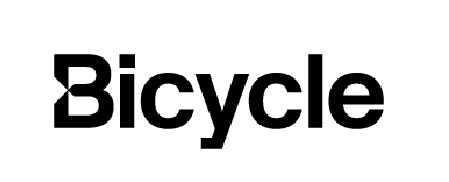




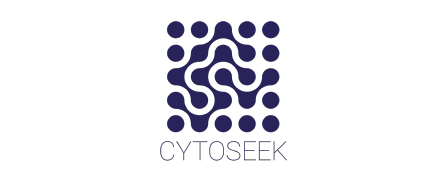






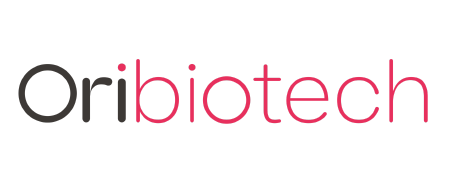







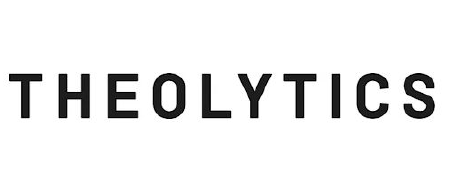
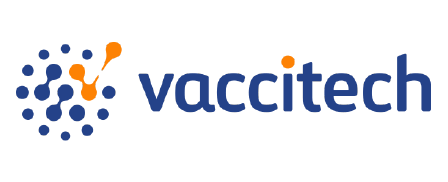
Over 1,200 employees across these innovative organisations participated in the data collection effort, anonymously sharing their identities and experiences. Altogether, Diversio collected more than 20,000 data points. The data included self-identified demographics (gender, racial/ethnic background, sexual identity, disability, mental health, cognitive learning), workplace experience metrics, as well as the region, seniority level, tenure and the department of each employee. Additional data was collected on social mobility with an understanding of the highest level of qualification within the individual’s household during formative years.
Diversio assessed inclusion, defined as the intersection of identity and experience, using its proprietary six-part Inclusion Framework. The Framework measures how individuals with different identities experience workplace culture, management, career development, work-life balance and psychological and physical safety. BIA was then able to benchmark the UK against global biotech diversity and inclusion data, comprising of professionals from the biochemistry, immunology and oncology space who are mainly based in North America. Member companies taking part in the BIA survey leverage Diversio’s AI driven recommendation engine, a database of over 1,600 evidence-based programmes, policies and practices proven to address inclusion pain points.
Having analysed the full dataset, BIA extracted eight key takeaways on the current state of diversity and inclusion across UK life sciences and biotech, producing recommendations to support both companies and the sector to take meaningful action.
 Diversity
Diversity
Over 20,000 data points from individuals across innovative life sciences and biotech in the UK were analysed. Diversity data included self-identified demographics across gender, racial and ethnic background, sexual identity, physical disability, mental health, cognitive learning and social mobility. An inclusive range of options were provided for each demographic to ensure self-identity within the survey. To assure anonymity, answers with less than eight respondents were not reported. Workplace experience metrics, as well as geographical region, seniority level, tenure, and type of department were also included. Intersectionality analysis across data points shows both strengths of the sector and future recommendations which are summarised in this report.
 Gender
Gender
1
Key
takeaway
UK life sciences and biotech is at parity with overall representation of men and women. However, this is not seen equally through job roles and drops significantly at C-suite and CEO levels.
UK life sciences and biotech industry is at general parity when it comes to overall representation of men and women, with women accounting for 51.2% of individual survey respondents. While the proportion of women holds steady at the management level for the organisations who took in the survey, the same representation is not seen at the executive or founder level, where women account for only 32% of C-suite roles and 26% of CEOs. This is an over-representation of that seen across the entire biotech sector – a trend that is consistent with the global biotech industry, based on Diversio’s internal global benchmarking data of companies that are actively measuring their diversity. Similar trends are seen in North America where according to BIO’s Measuring Diversity in the Biotech Industry 2022 report 34% women in senior executive roles decreases to 20% of CEOs13 for companies choosing to measure their diversity.

Kristen Albright
CEO, Prokarium
At Prokarium, we’re proud to be at the forefront of the biotech industry with our female-led team united with a mission to unlock a new generation of immuno-oncology therapeutics.
With diverse backgrounds and experiences, our team embodies Prokarium’s commitment to promoting diversity and inclusion. Despite the industry’s statistics, Prokarium is setting ourselves apart by breaking the mold with our female-led team that’s forging ahead in promoting diversity, equality, and inclusion. By championing DEI, we’re cultivating an environment that values differences, fosters innovation and drives business success. We are proud to be making a difference at Prokarium and we will continue to pave the way for a more diverse and inclusive biotech industry.
Gender balance across leadership roles
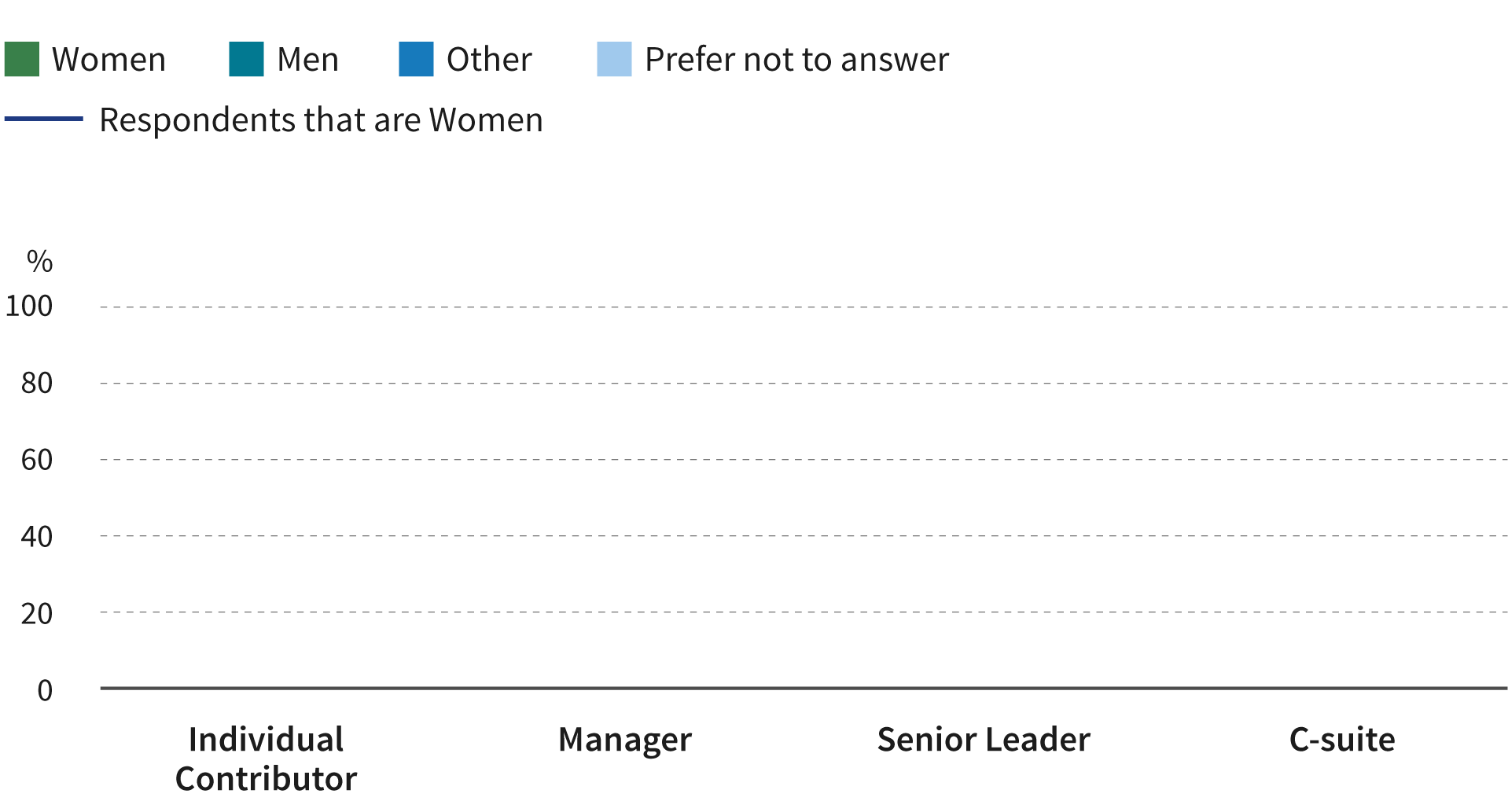
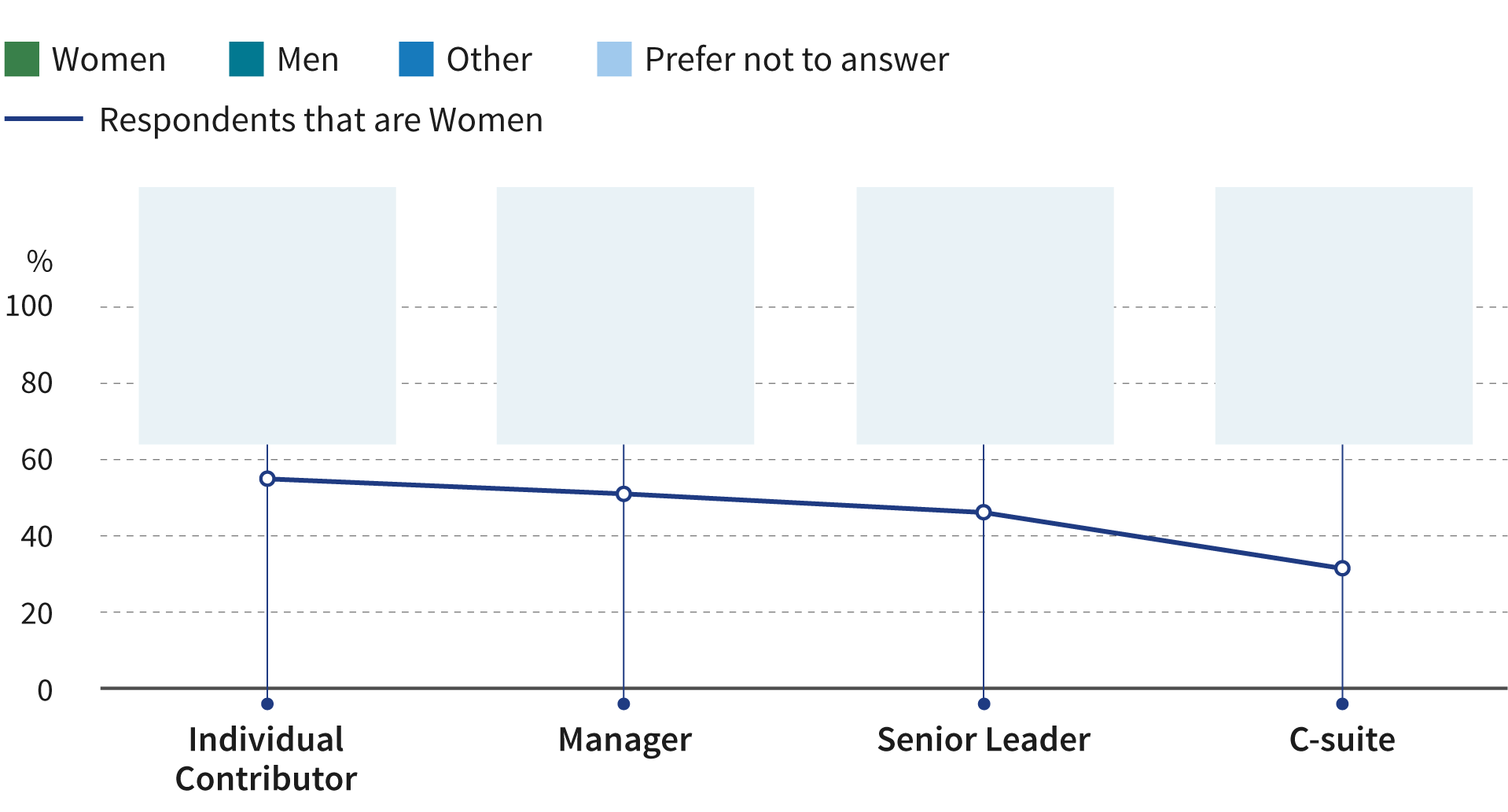
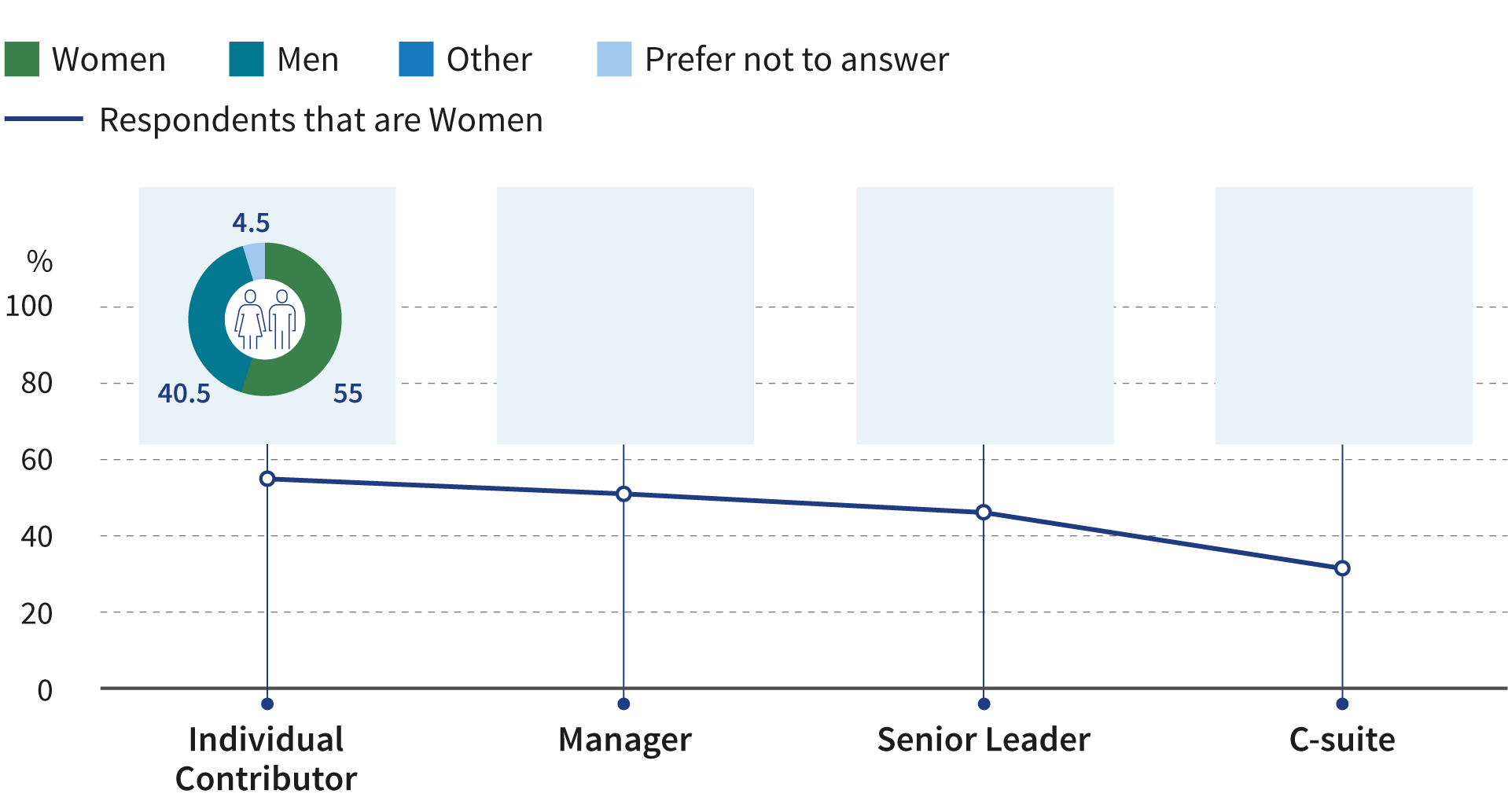


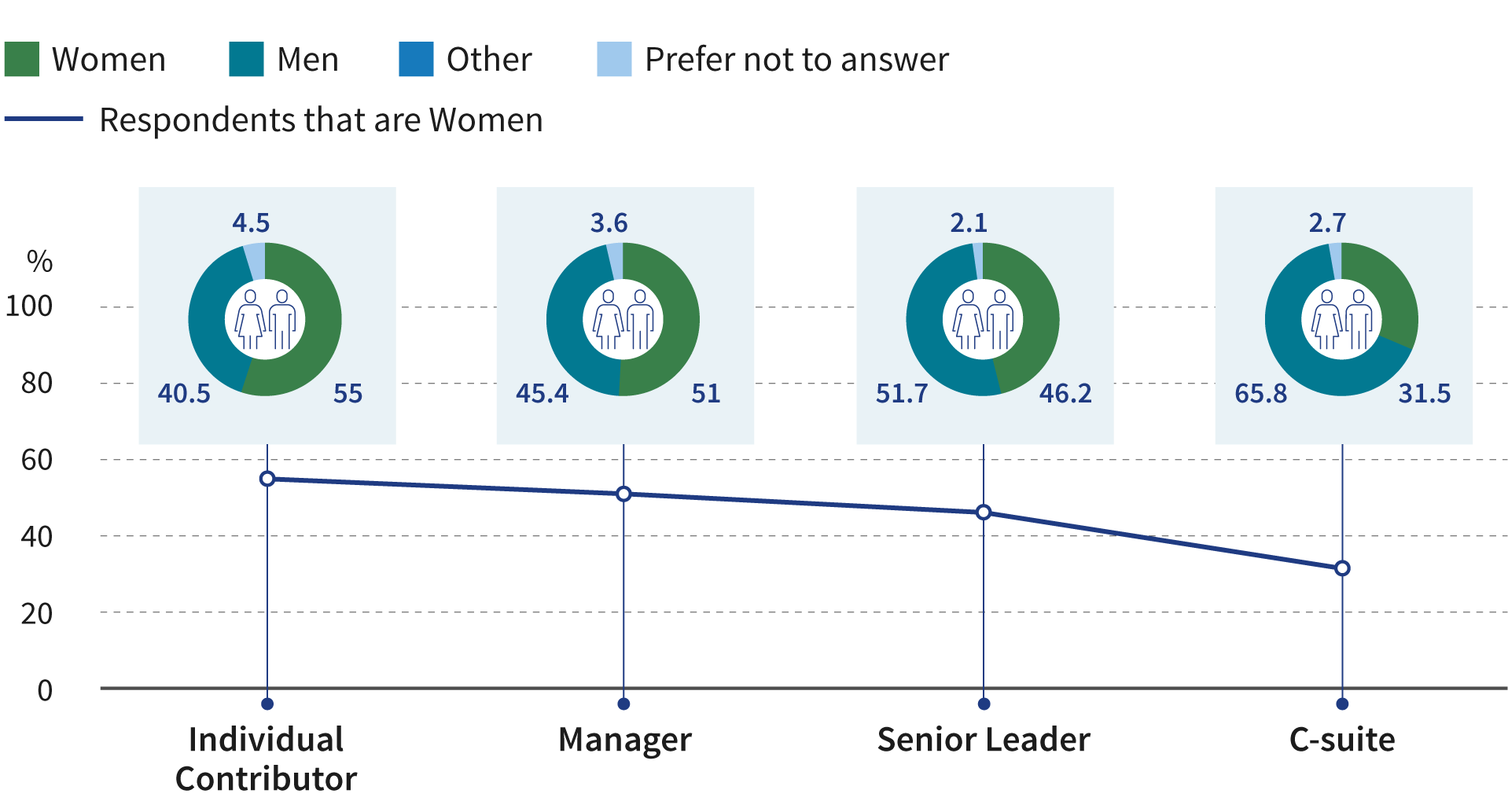
Survey data shows that there is a significant difference in proportions of men and women reported at departmental level. Business functions including finance, IT and Human Resources have the highest proportion of women at a ratio of 60:40 (women to men) and for scientific roles the ratio is 50:50. From survey feedback, team meetings are well balanced, language is unbiased, organisational culture is accepting and workspaces are flexible to meet individual needs. There are less women working in biomanufacturing and engineering occupations (35:65), decreasing further in digital and computational jobs (30:70) across the sector. There is little difference on inclusion scores for men and women in scientific roles; culture is seen as inclusive, management is fair and transparent, and career development is supportive. There is a notable difference in workplace flexibility across responses from men and women, which spans all departments. In engineering and biomanufacturing roles there is a significant difference reported with workplace culture.
Gender balance across departments
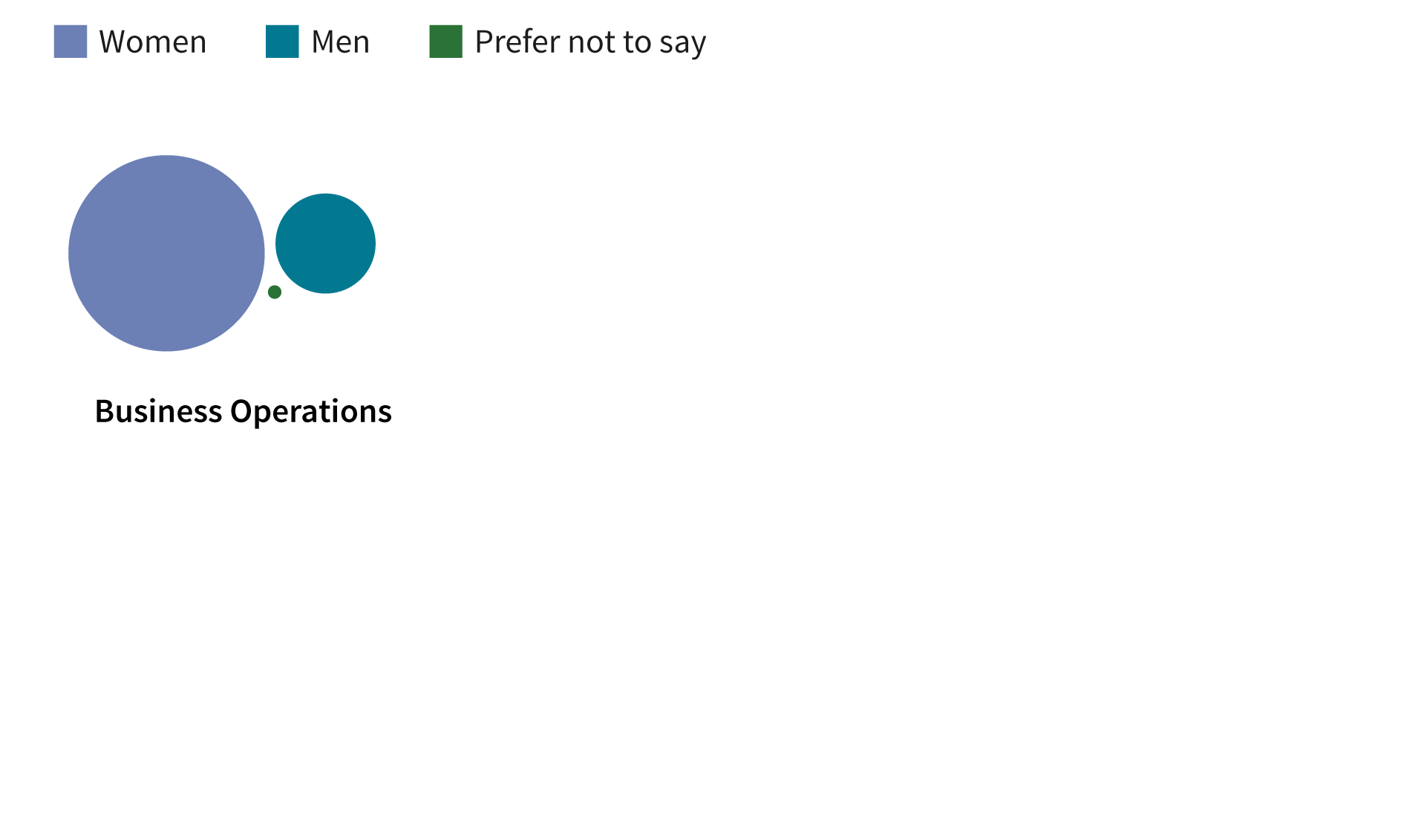
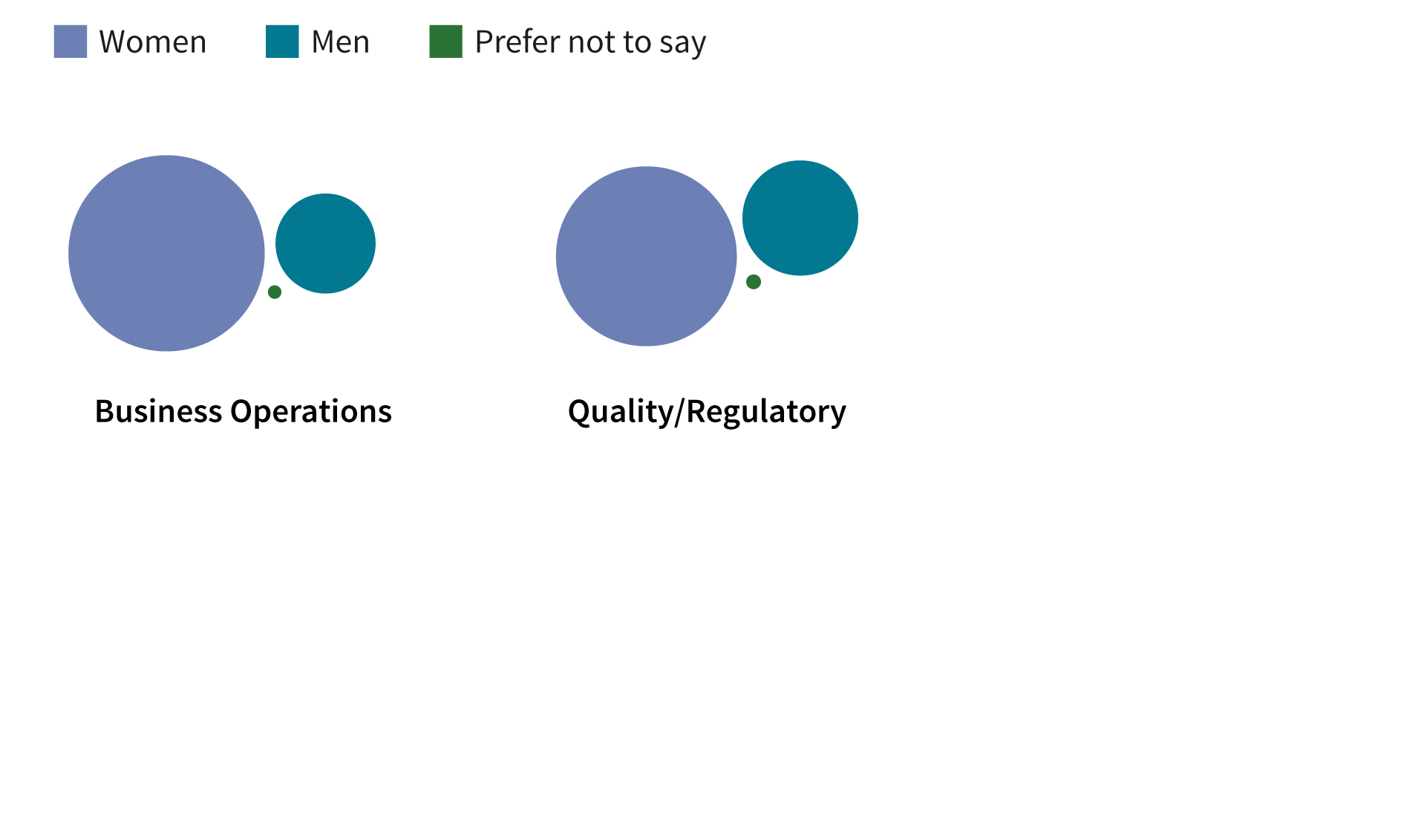
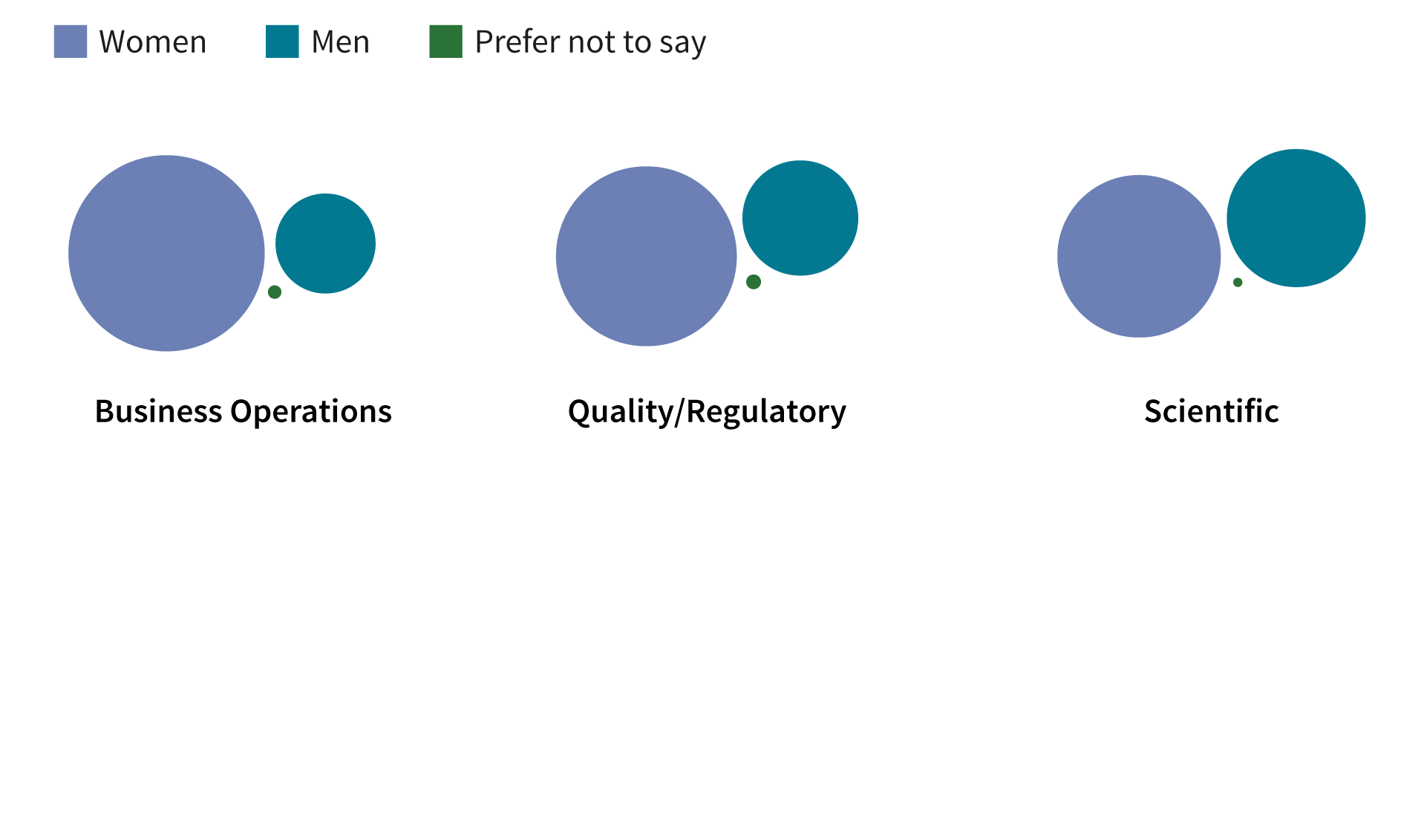
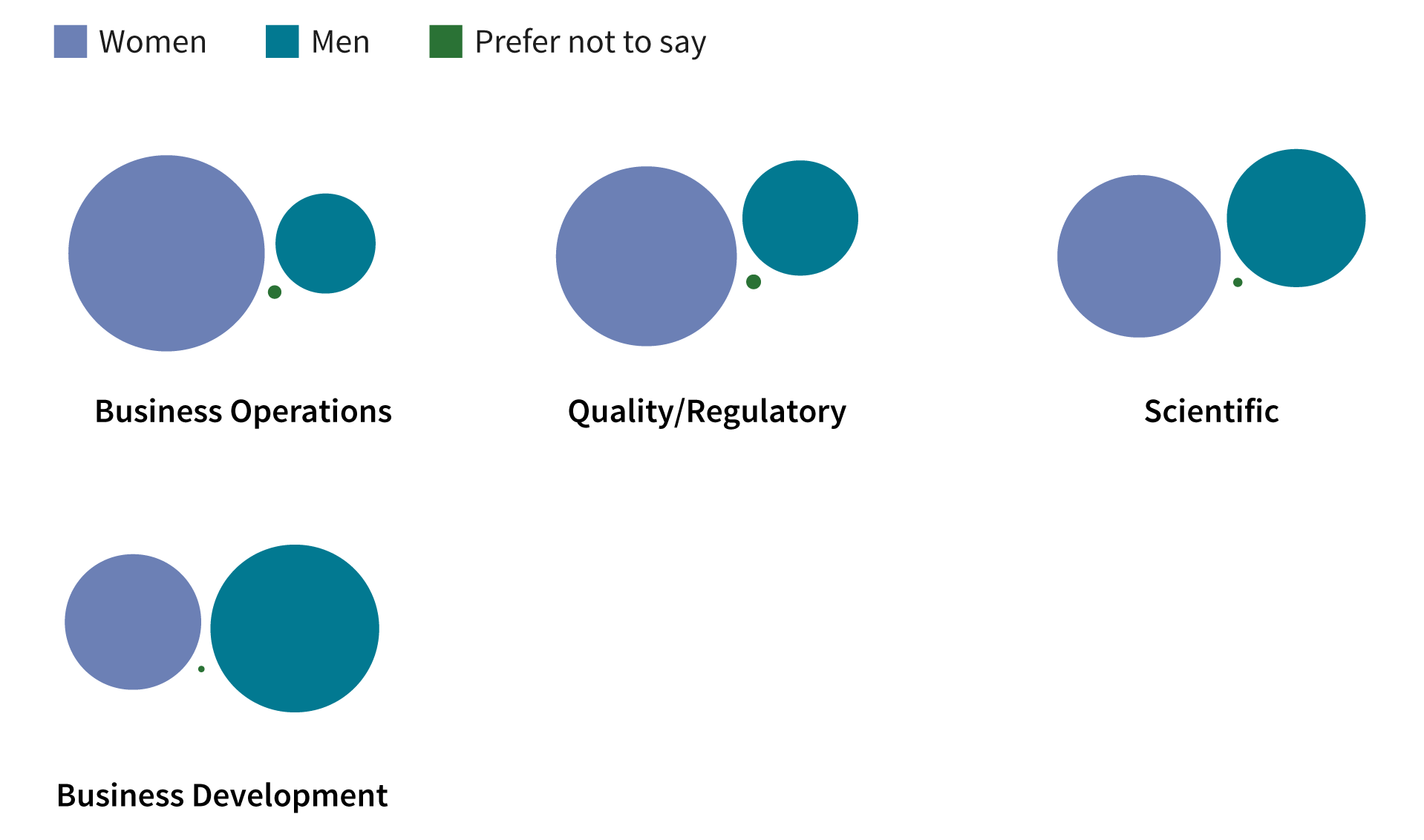
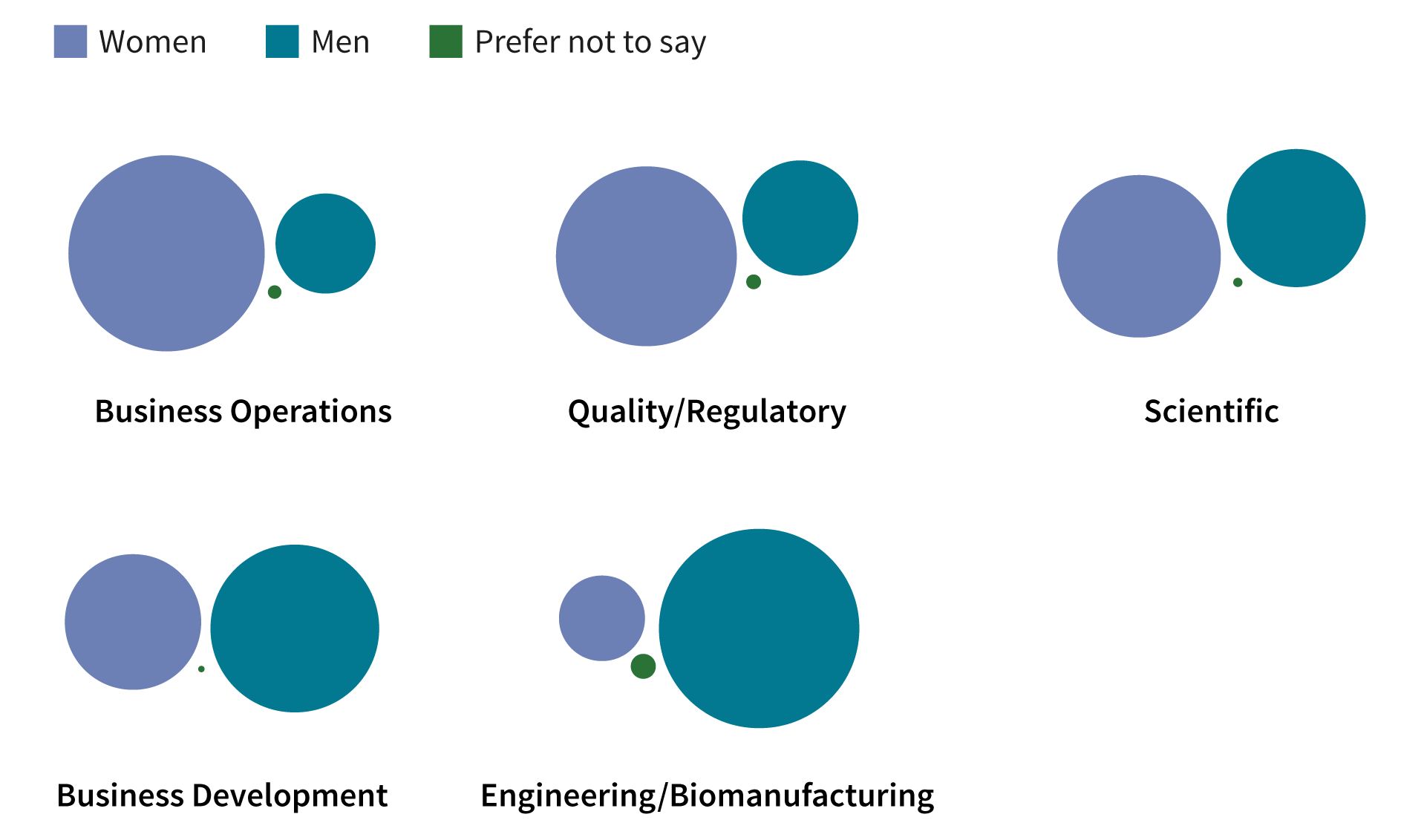
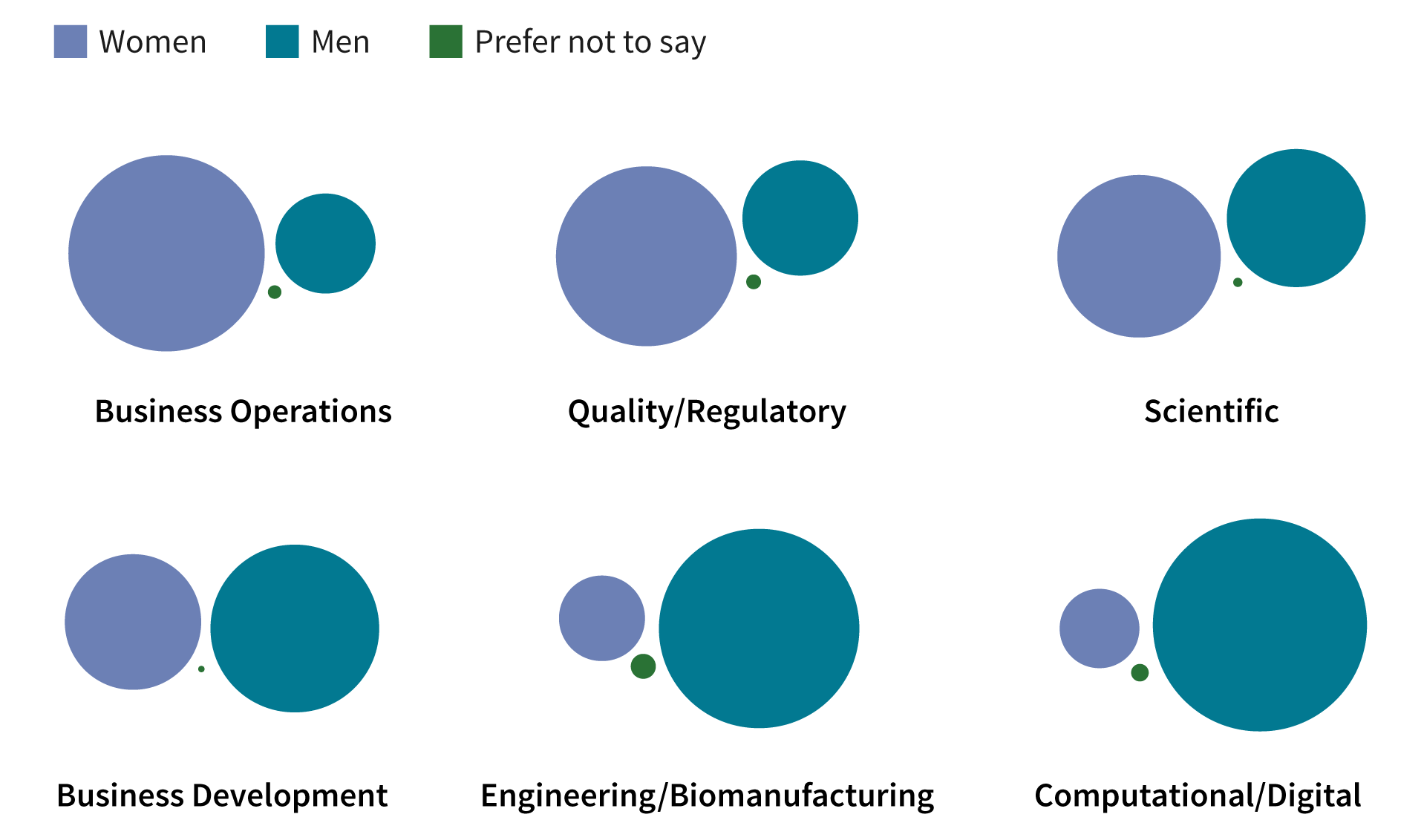

Rosie Rodriguez
VP of Growth and Operations, Relation Therapeutics
Achieving gender balance across computational roles is key to our growth and has not been without its challenge. We have 40% women in senior leadership positions at Relation, every leader at Relation is passionate about DEI and we are working hard to ensure this is reflected in our recruitment process.
In addition to our focus on DEI during all phases of recruitment, in particular for the computational, data science (DS) and machine learning (ML) roles, our reach-outs also include more gender focus with fora like Women in Artificial Intelligence (AI) and DS as well as working with recruitment partners who are as passionate about this as we are. Importantly, all our interview panels comprise 50% women to ensure the panels represent our company. This is very important to us, as it signals our focus on our candidates regardless of their gender. We also want to be clear that pay parity is at the centre of these efforts. We have strict processes in place to ensure pay is equitable across grades regardless of gender.
And thinking beyond now, we are working on ensuring upcoming generations of women focus on DS/Computational/ML as part of the STEM work with KQ and others.
 Race
Race
2
Key
takeaway
UK life sciences and biotech is as racially and ethnically diverse as the broader UK population. However, there is notable under representation of Black employees and leaders.
The survey data shows that the UK life sciences and biotech industry is as, if not slightly more, racially and ethnically diverse than the broader UK population, with 19.6% of survey respondents identifying with a racial and ethnic minority background vs 15% within the UK population taken in 202114. That being said, Black employees are notably under-represented in the biotech industry, hovering at about 1.6% versus 3.5% within the UK population. A drop in representation is seen when it comes to racial and ethnic minorities in senior leadership roles (13%) and C-suite levels (15%). 11% of company CEOs within the survey are men from a racial or ethnic minority backgrounds, however, no women from BAME (Black, Asian and minority ethnic) backgrounds were recorded at CEO level. There was also meaningfully more Black employees noted within engineering and bioprocessing roles (3.4%) and no employees and no Black employees reported in digital and computational roles.
Racial and ethnic diversity across leadership roles
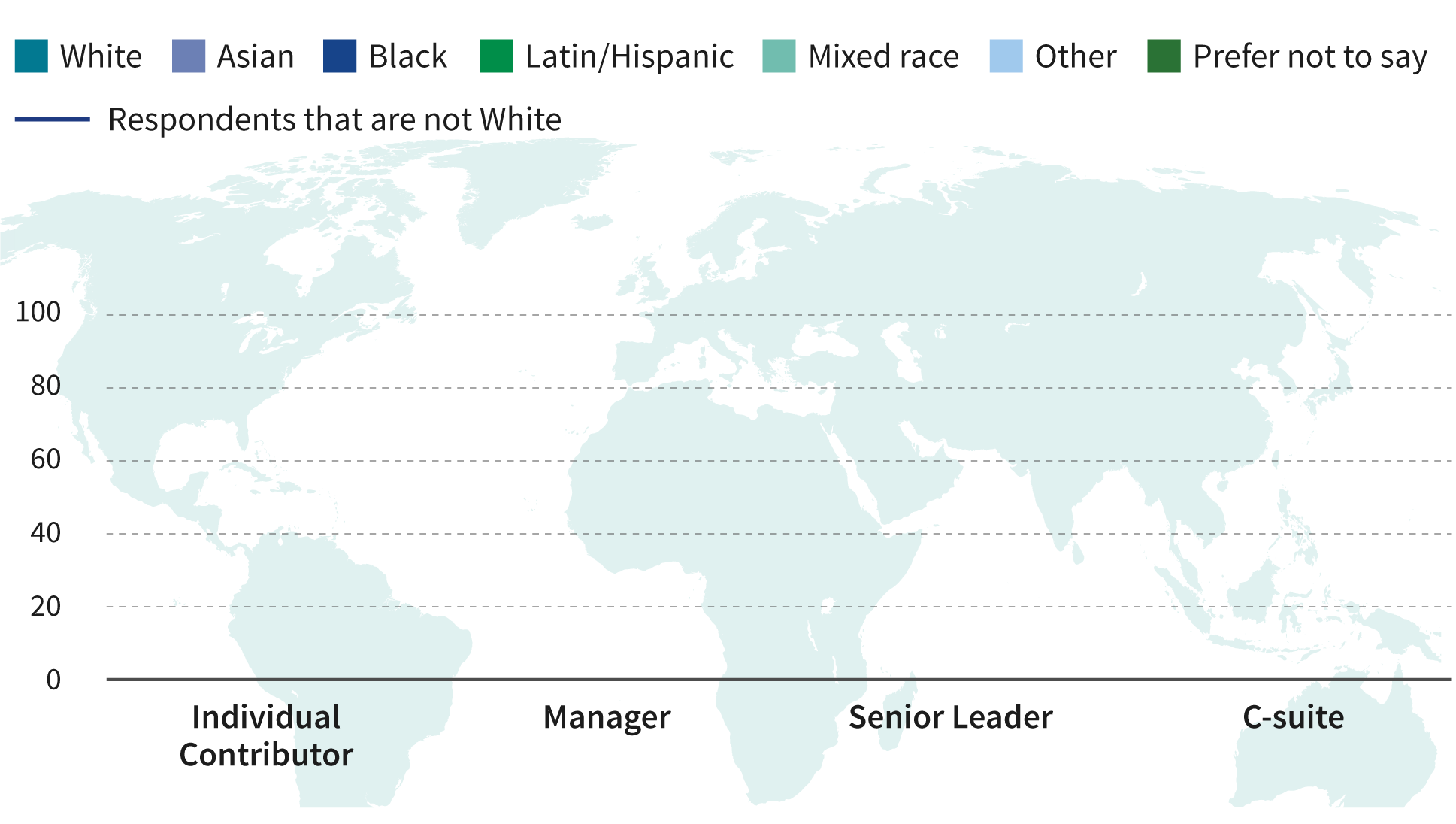

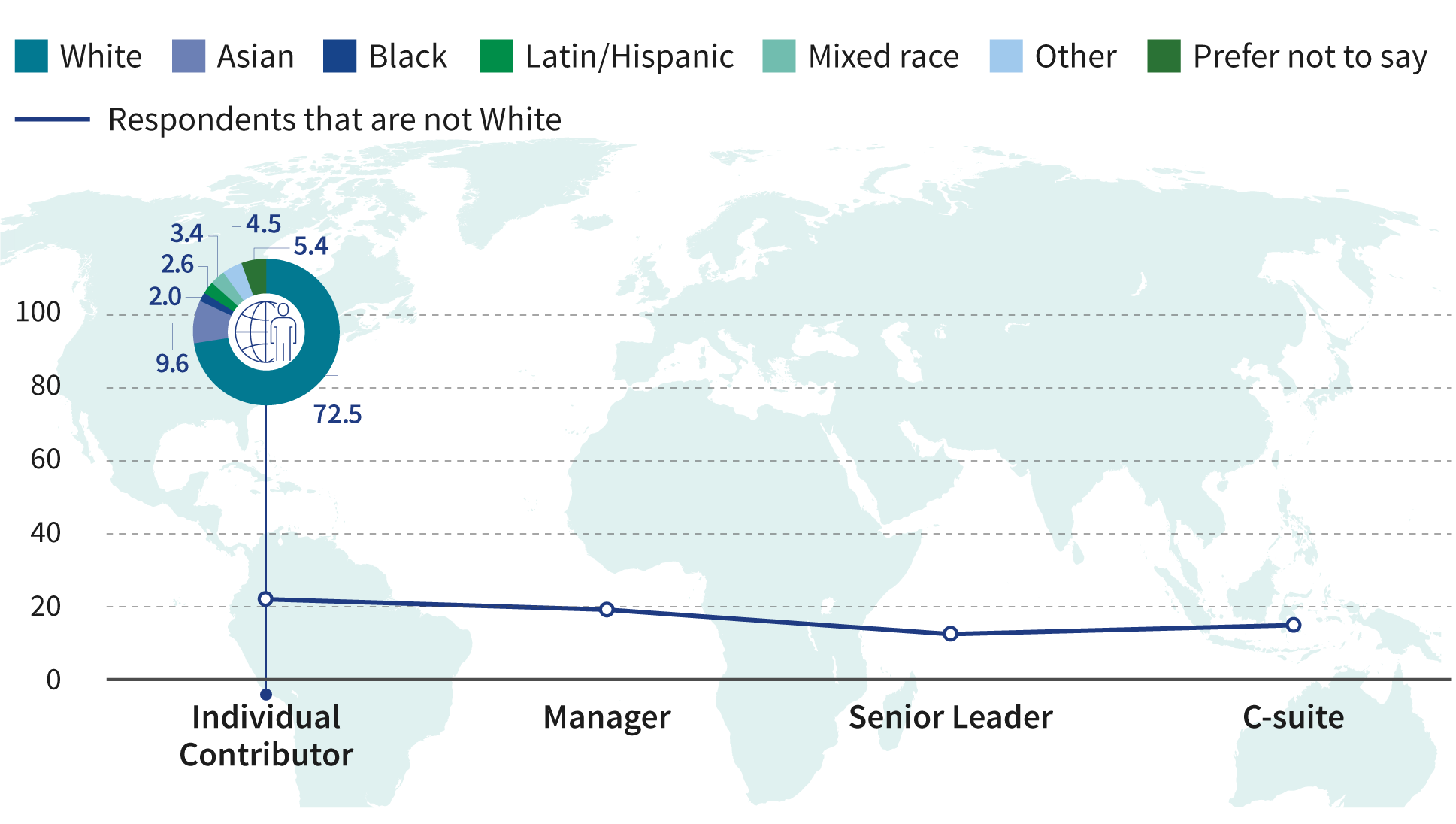
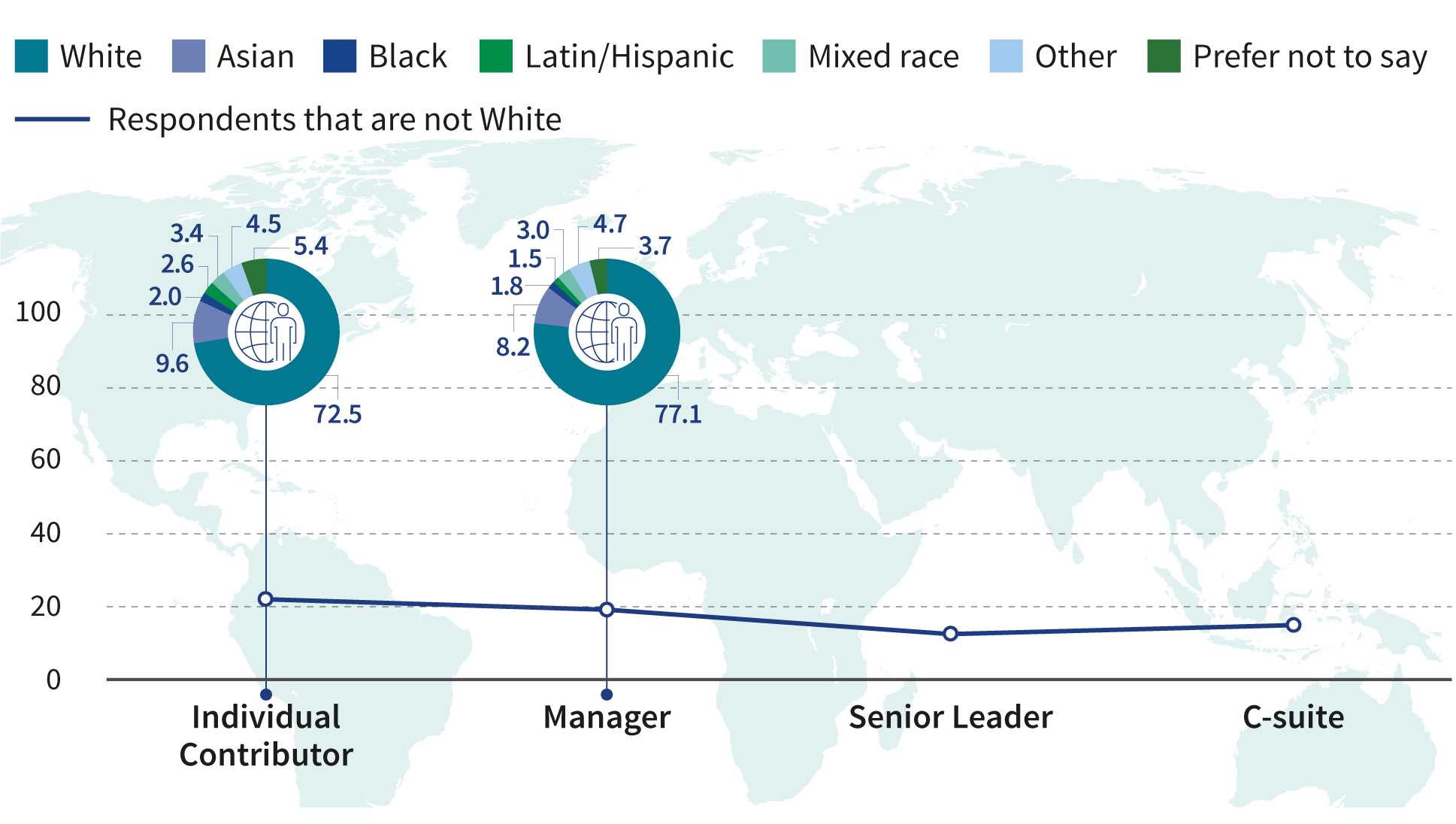
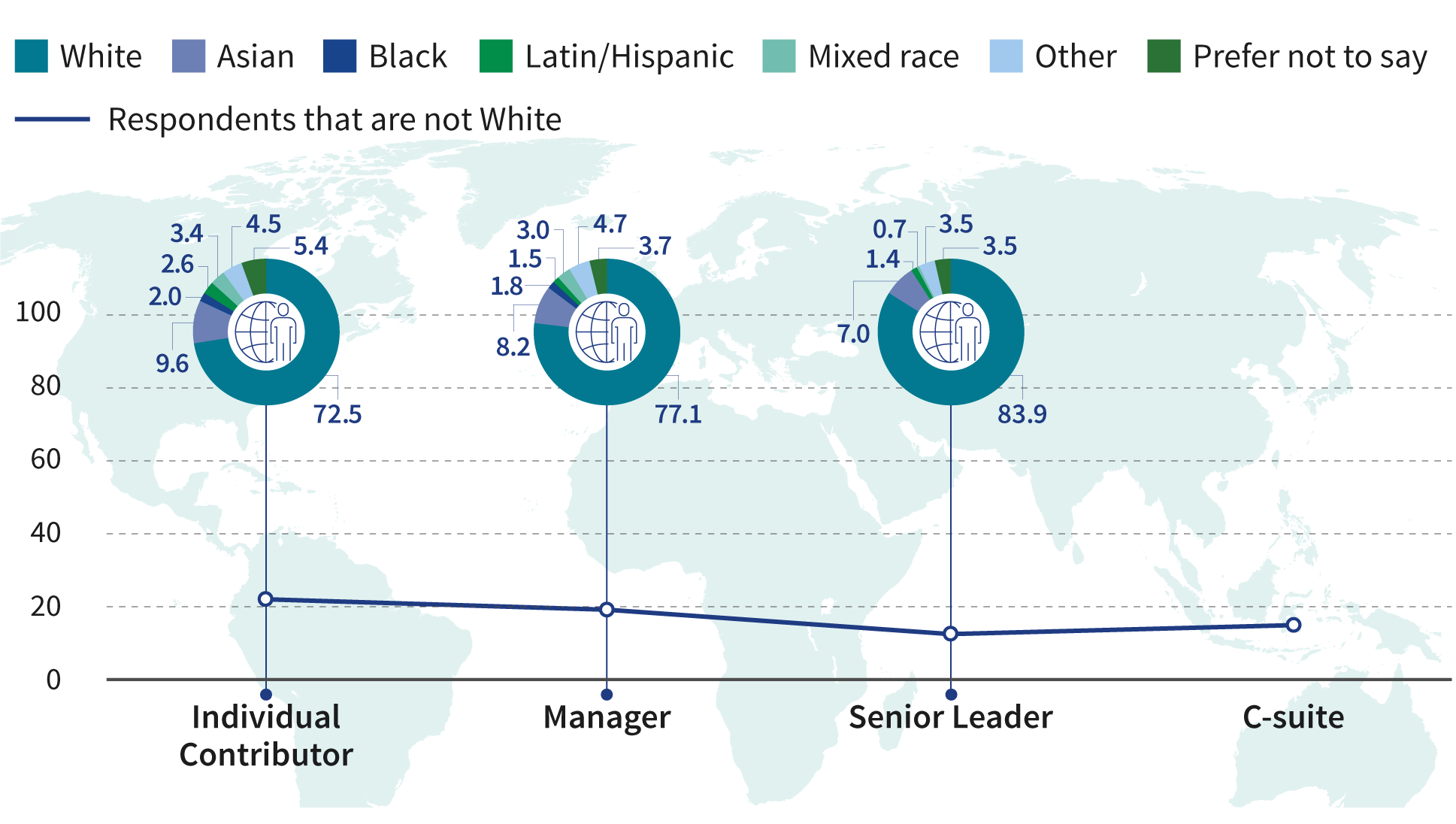


Nerida Scott
Regional Head, Johnson & Johnson Innovation EMEA
There are such a variety of different career experiences across Johnson & Johnson that build on STEM training. I believe these talented STEM students should have every opportunity to excel in their chosen field. We hope by giving them mentoring and work experience it will help them to build the awareness of potential opportunities, areas of interest and personal networks that can help propel their success!
We hope by giving them mentoring and work experience it will help them to build the awareness of potential opportunities, areas of interest and personal networks that can help propel their success!
As part of their commitment to fostering a workforce that reflects the diversity of both patients and customers, Johnson & Johnson UK’s STEM Scholars Programme has been specifically created to support Black students in London studying STEM in further education.
It is aimed at those who have the potential to excel in a career in STEM but need better access or knowledge of routes into their chosen careers. As part of the programme students are matched with a Johnson & Johnson mentor, attend regular workshops developing essential skills, join guest speakers to build their understanding of the healthcare industry and STEM careers, and take part in work experience events.

Sophie Jerrold
Development Director, British Neuroscience Association
The British Neuroscience Association (BNA) Scholars Programme aims to support students and early career researchers from underrepresented ethnic groups to thrive in neuroscience and to build a supportive community through networking opportunities, bursaries and mentorship.
Every year, BNA offers seven places to the three-year program and includes a broad range of bespoke career development opportunities provided by academic and commercial supporters of the Programme, as well as free membership to the BNA, the Federation of European Neuroscience Societies (FENS), funding opportunities, and more.
BNA scholars must be a final year undergraduate, Masters, PhD student or an early career research technician/assistant affiliated with a UK Higher Education institution who self-identify as BAME, are interested in pursuing a future career and have research interests in neuroscience and/or the wider neuroscience sector.
 Sexual Orientation
Sexual Orientation
3
Key
takeaway
8% of survey respondents identified as LGBT2+. At C-suite level there was insufficient data to analyse.
8.2% of survey respondents identified as part of the LGBTQ2+ community, a slightly lower percentage than what is observed in the North American biotech industry, which hovers around 11% and much higher than reported in the England and Wales census of 2021 which reported 3.2%15. It is important to note that a disproportionally large number of respondents preferred not to answer these questions (8.7%) as within the census data (7.5%). This could suggest that there are likely more LGBTQ2+ individuals in the industry. However, there may be a level of discomfort being ‘out’ in the workplace, their identity may not have been included as an option, or potential concerns over treatment of answers generally across data collection processes. Of note in this analysis for the UK biotech sector is the lack of data at C-suite levels across the organisations surveyed.
Diversity in sexual orientation across leadership roles
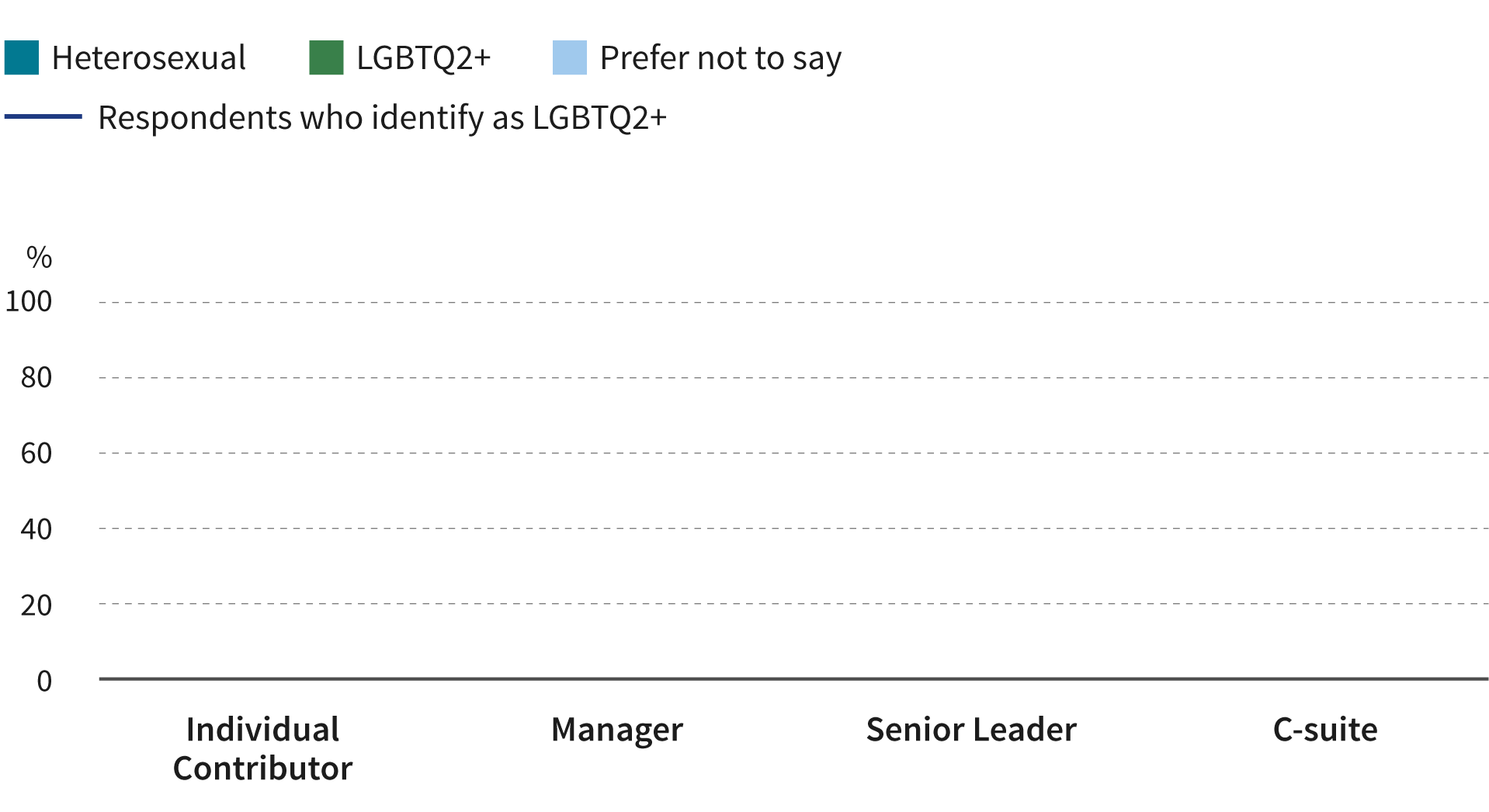
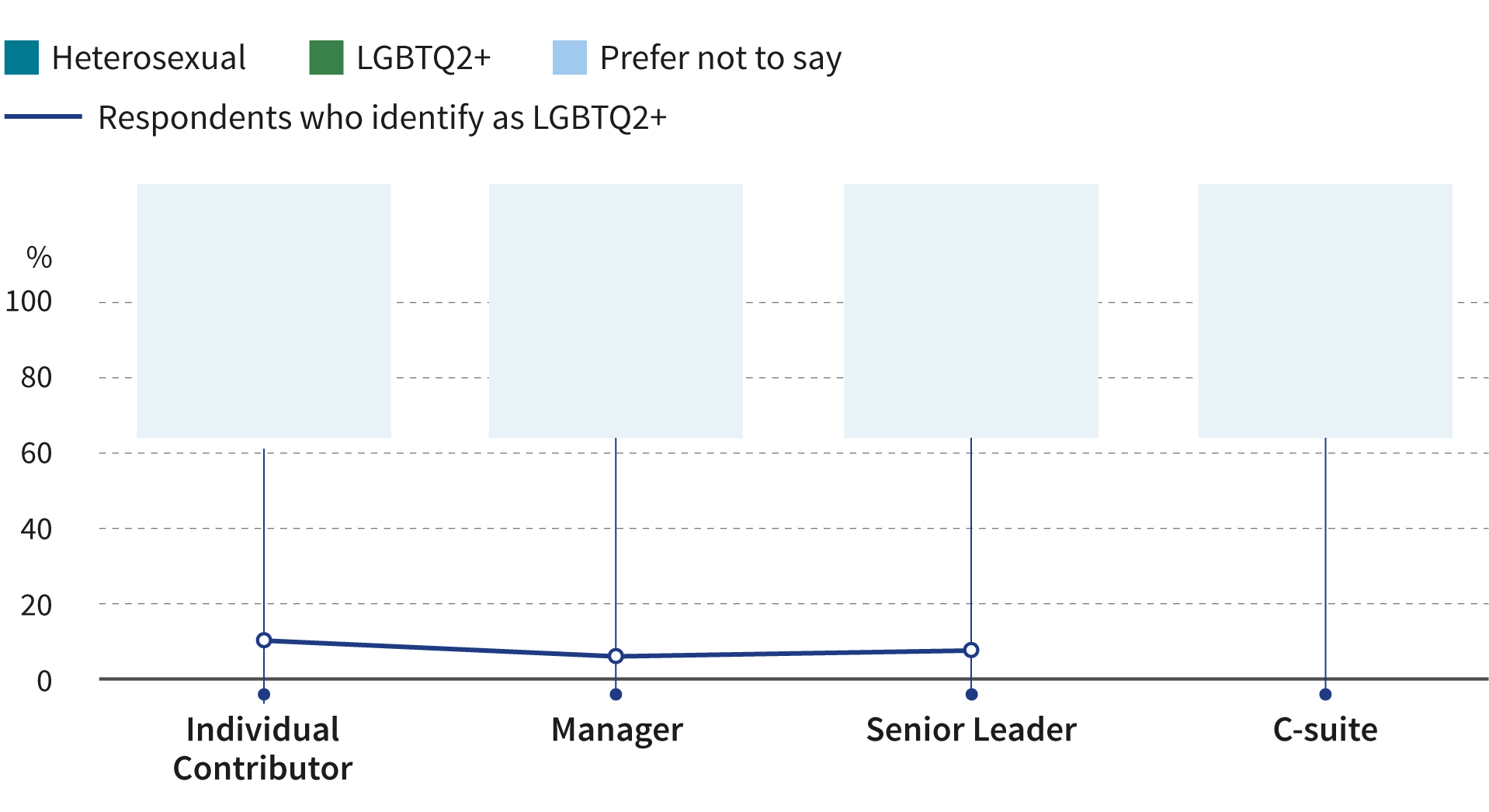
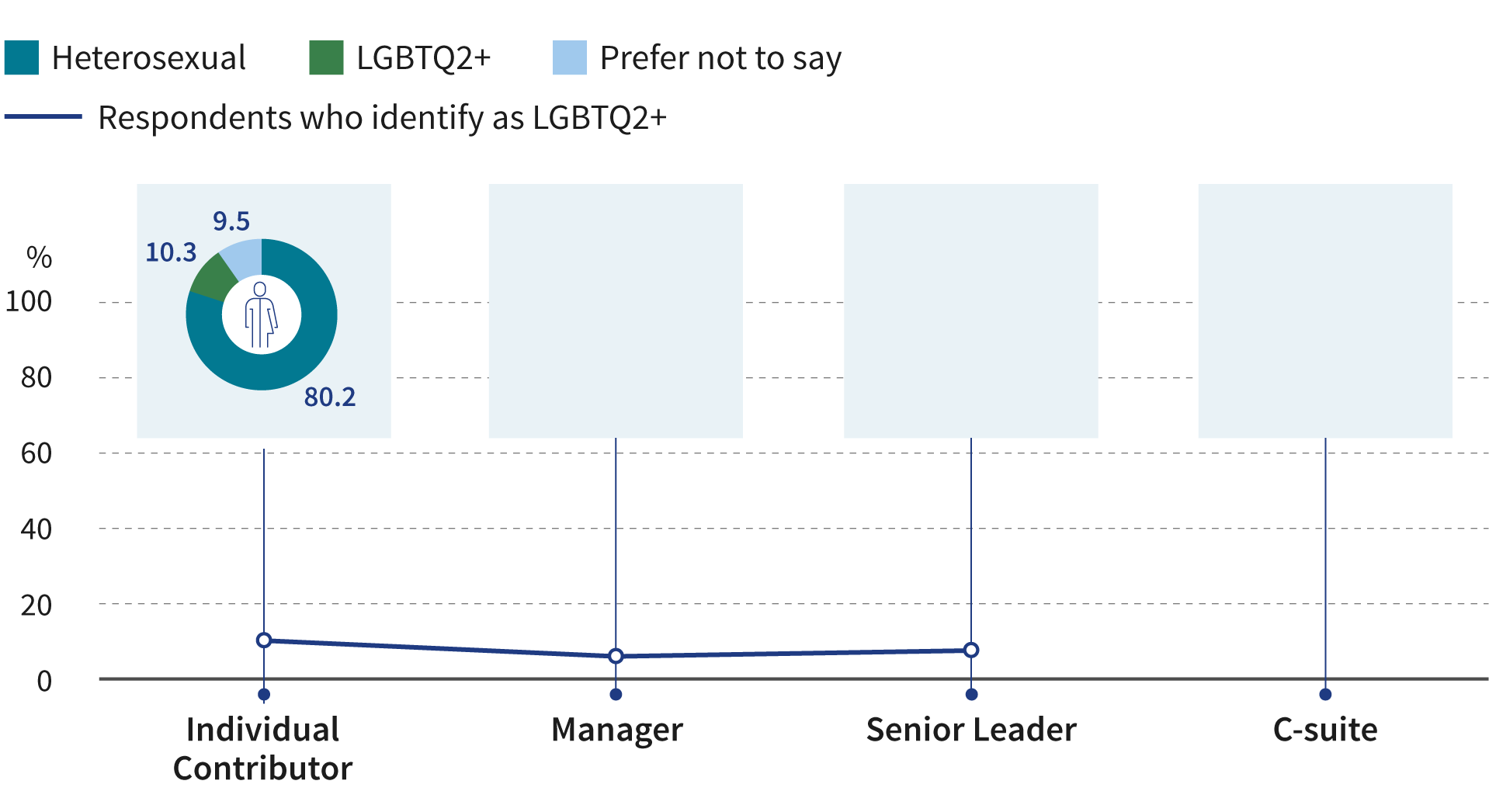




Tim Funnell
Partner, Monograph Capital, CEO, Ascend, Founder, OUTbio
Networks like BIA are important in this industry as we typically work in small biotech teams and may miss the broader diversity within the ecosystem. It can feel lonely, like you are ‘the only one’ in a company, but this report shows that the UK life sciences scene is buzzing with talented people from all walks of life, independent of gender, ethnicity and socio-economic background.
 Disability and Mental Health
Disability and Mental Health
5
Key
takeaway
33% of surveyed individuals within UK biotech reported a physical disability, cognitive learning, or mental health condition. Combining data analysis with race and gender reveals specific pain points to address.
Physical ability, cognitive learning and mental health
Across participating companies we saw that 32.8% of employees self-identified as having either a physical disability, cognitive learning or mental health condition – meaningfully higher than the government statistic on UK working age adults which currently sits at less than 20%19. This discrepancy can likely be partially attributed to the stricter definition of the UK government, which requires individuals to have had a physical or mental health condition or illness for more than 12 months to be classified as an individual with a disability.
Physical ability, cognitive learning and mental health reporting across leadership roles
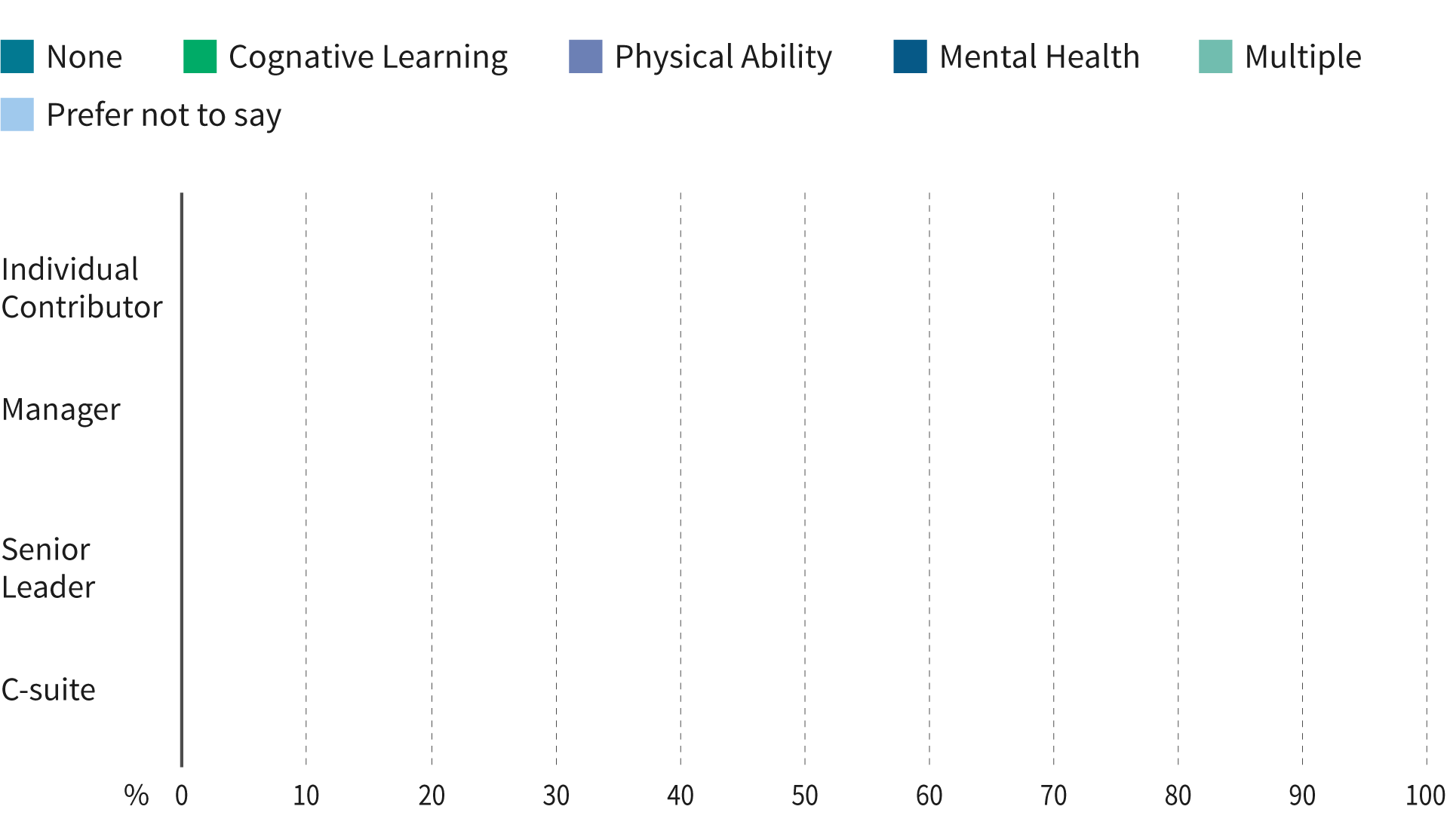


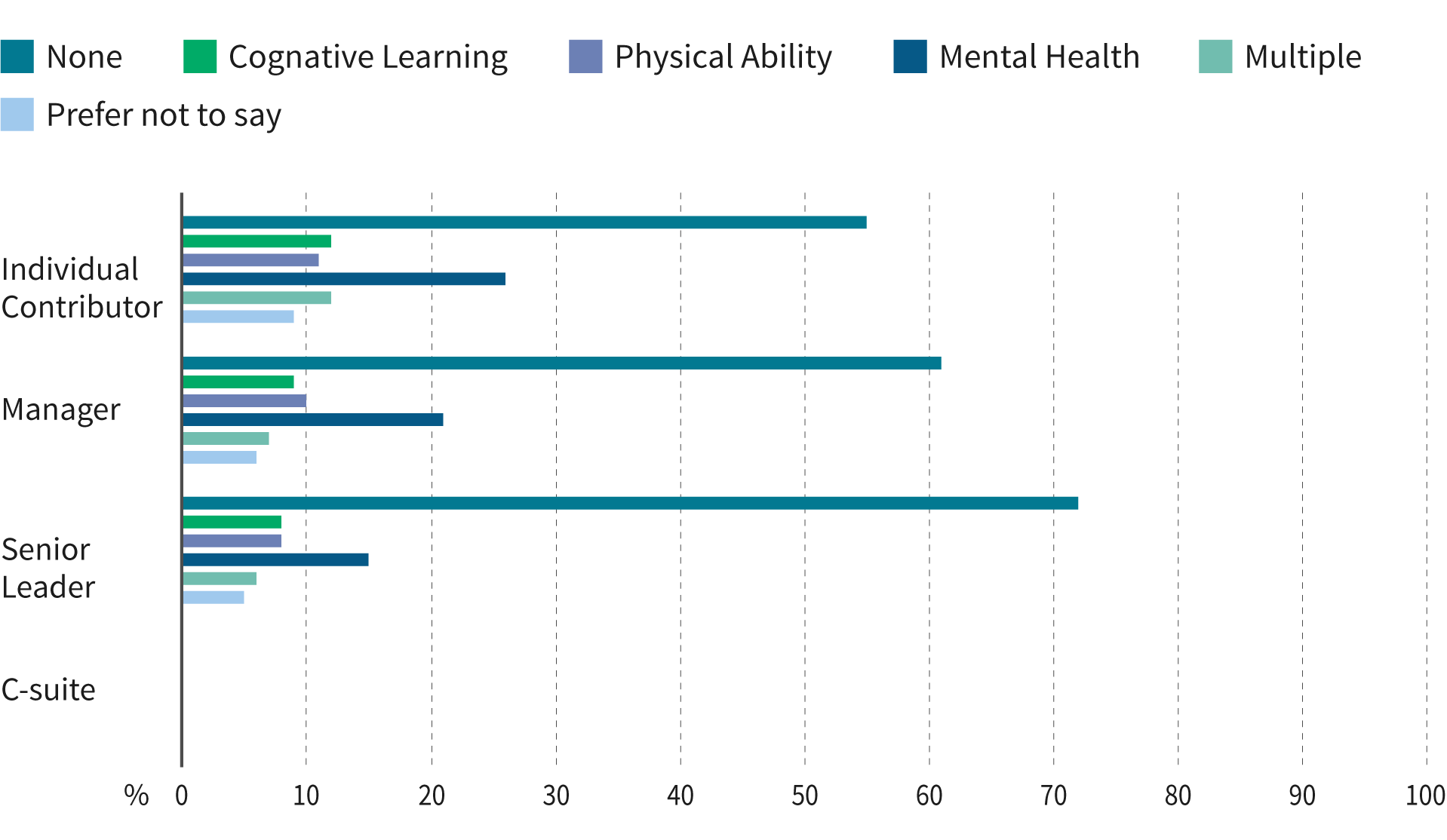
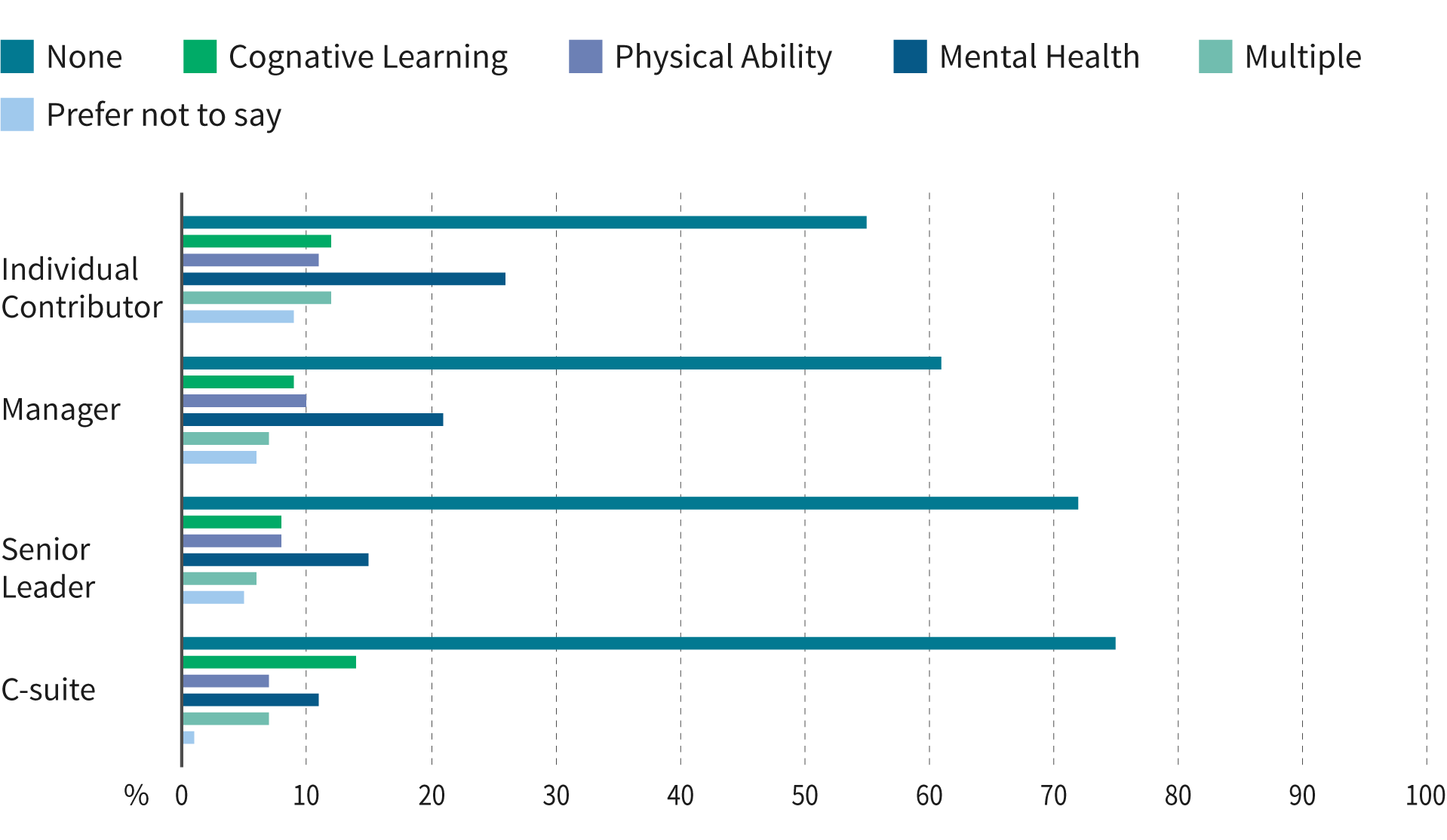
Diversio’s broader dataset shows that the prevalence of adults recognising their mental health has been consistently on the rise over the last several years, with meaningful year-over-year increases. This trend, in combination with the numbers collected from the employees at BIA member organisations shows a willingness to share mental health conditions, however, the numbers self-reporting decrease through seniority levels and levels of ‘prefer not to say’ increase.
Our data across UK biotech shows a steady number of individuals self-reporting a physical disability across levels, ranging from 11% to 7%. Combining this analysis with the inclusion scores shows little difference across those with and those not reporting a physical disability on fair management, career development, or workplace flexibility. There is a difference in measurement of whether the individuals feel like they are a part of a team and can make a meaningful contribution alongside their peers, determined through questions on inclusive culture. When combined with gender it is important to recognise that women in our sector with a physical disability scored workplace safety as the largest pain point.
Intersectional data analysis: Inclusion scores for all employees with and without a physical disability
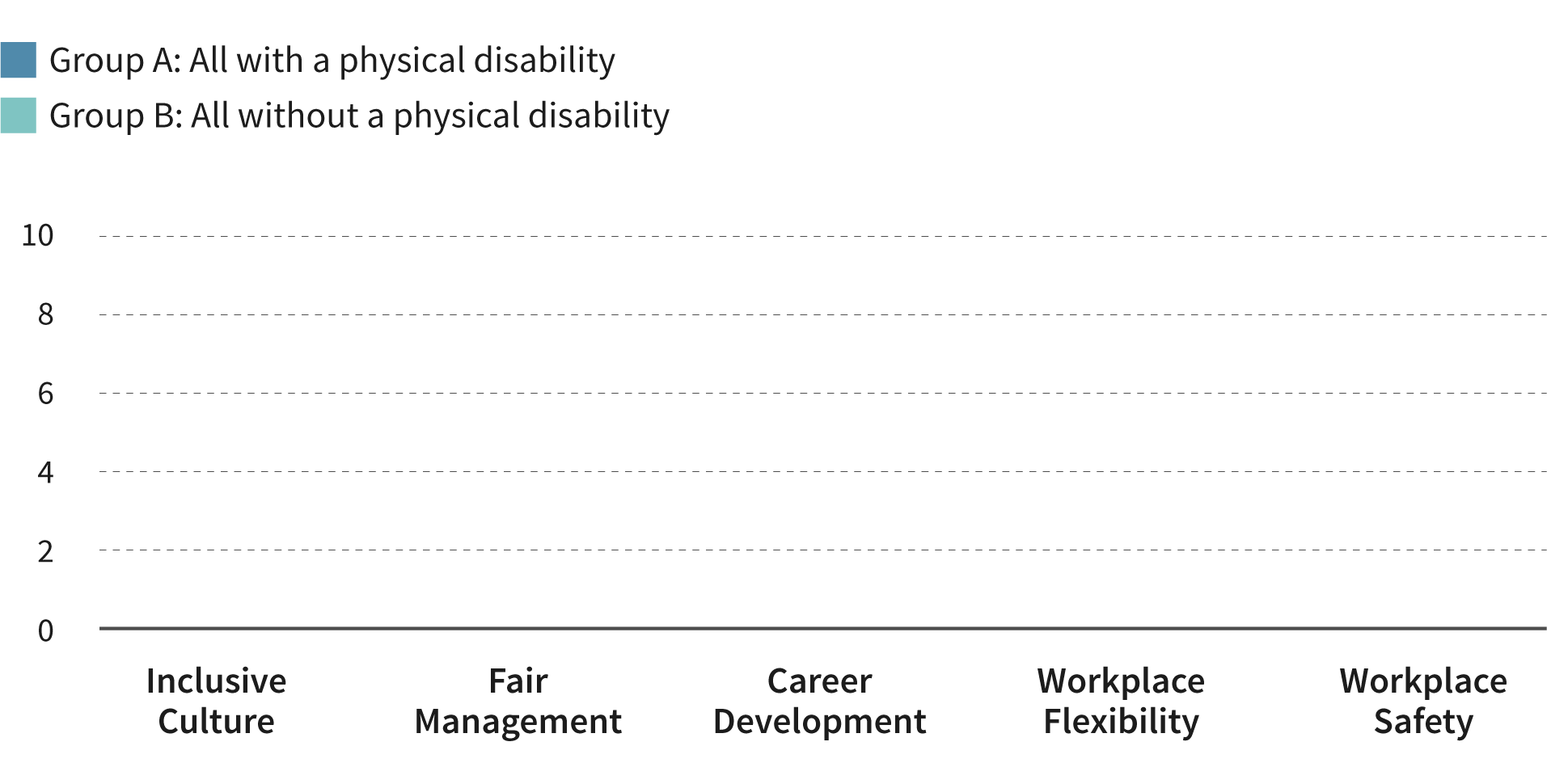
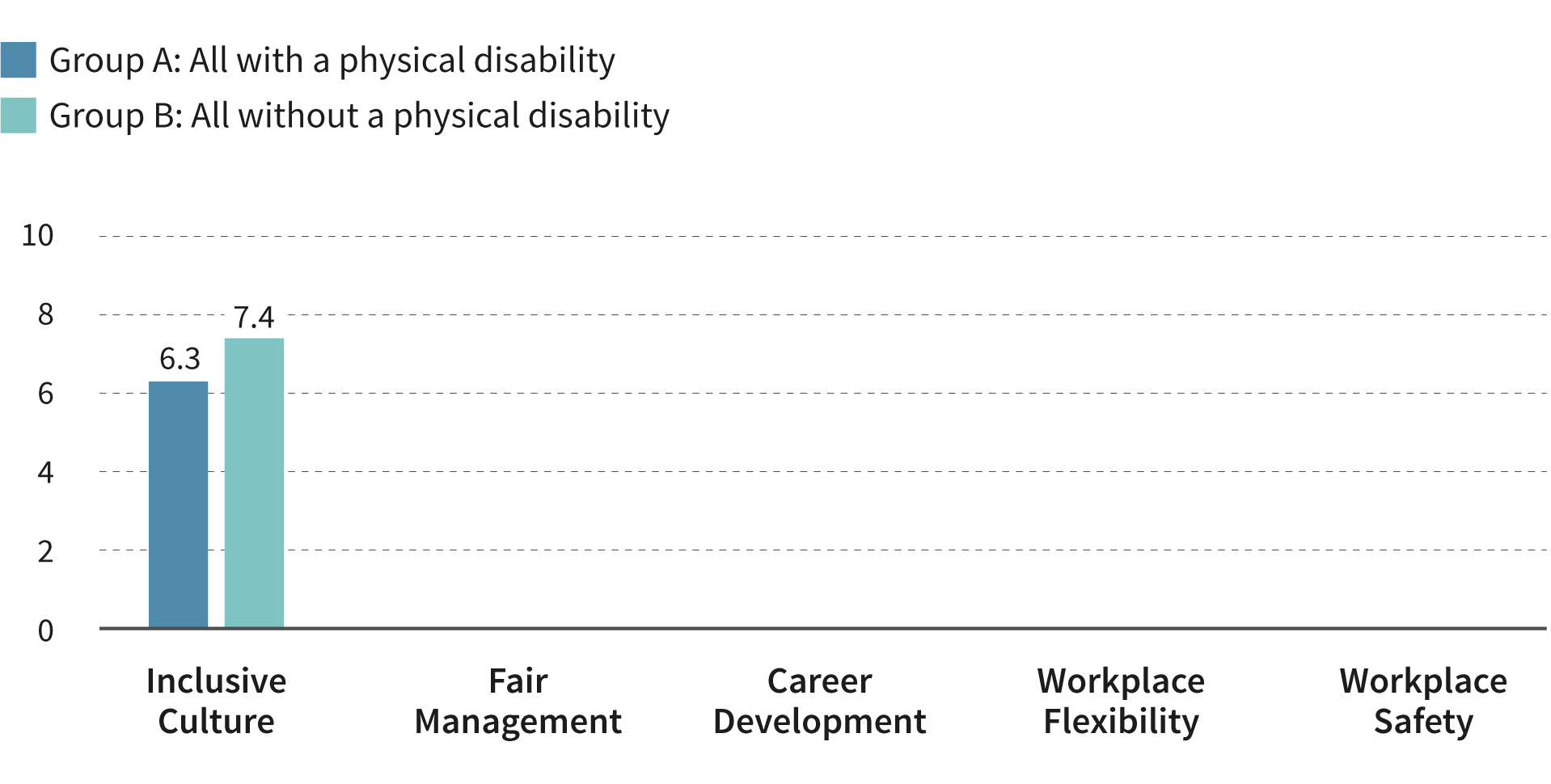

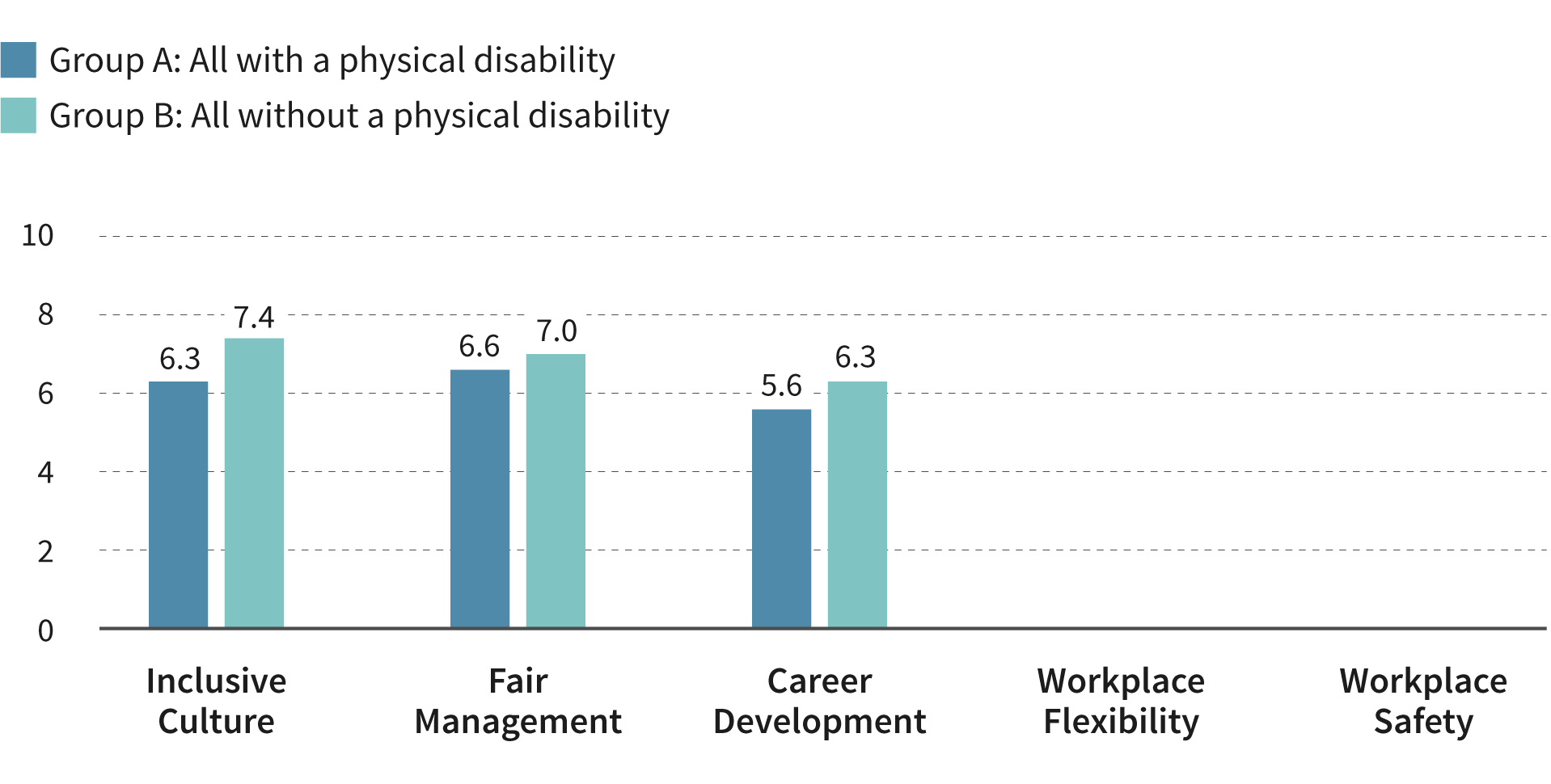
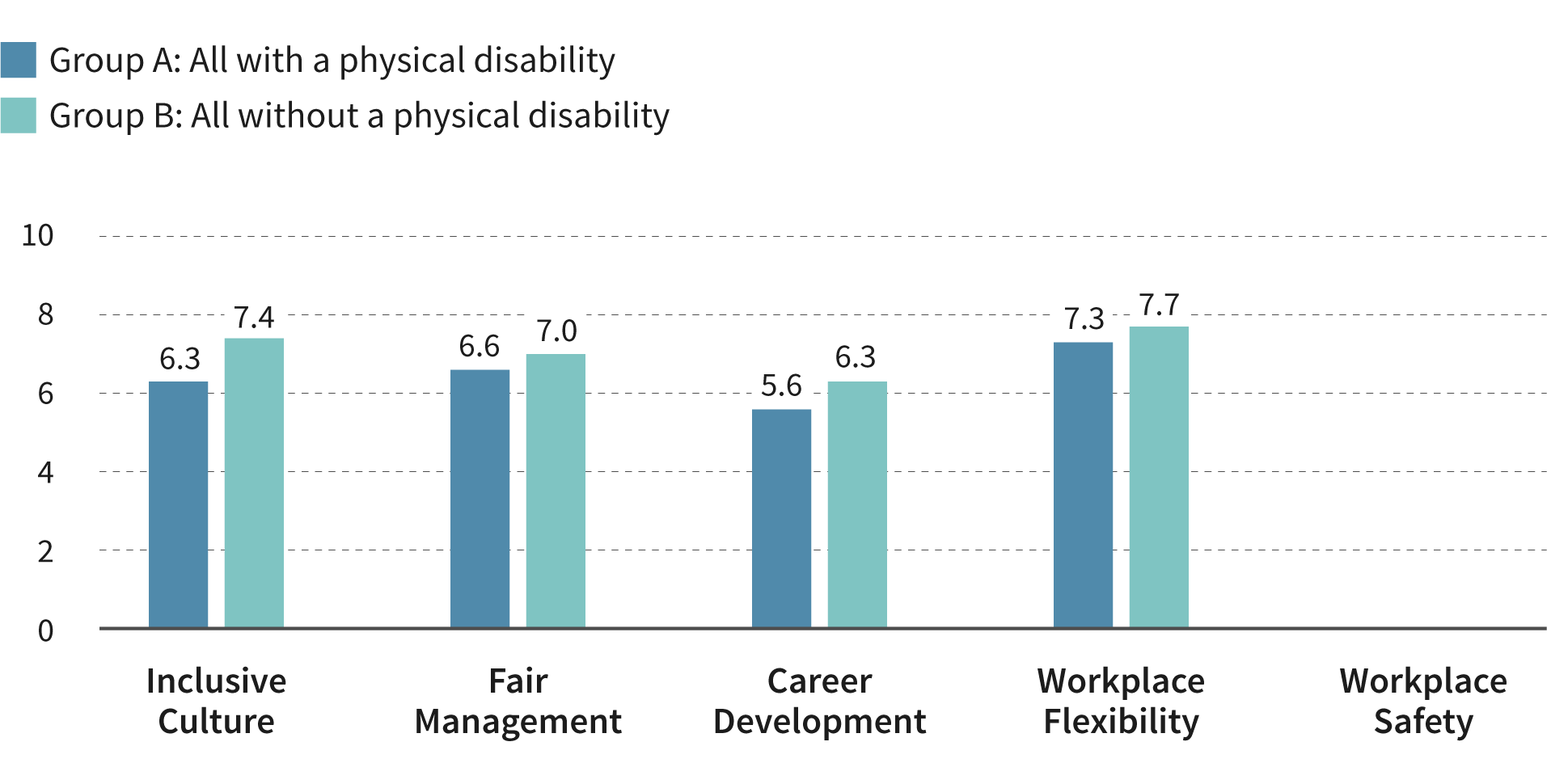
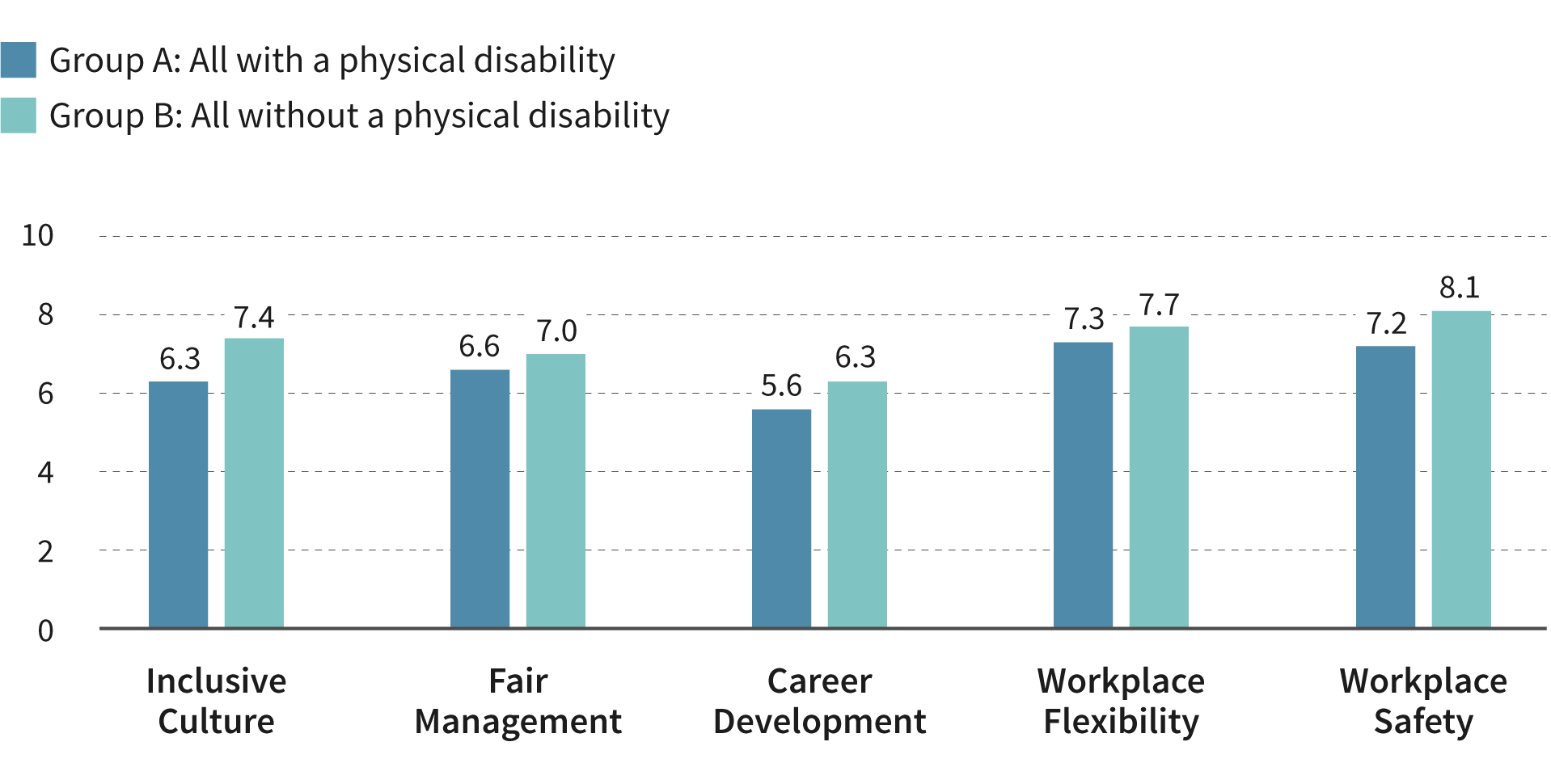
Intersectional data analysis: Inclusion scores for women with and without a physical disability
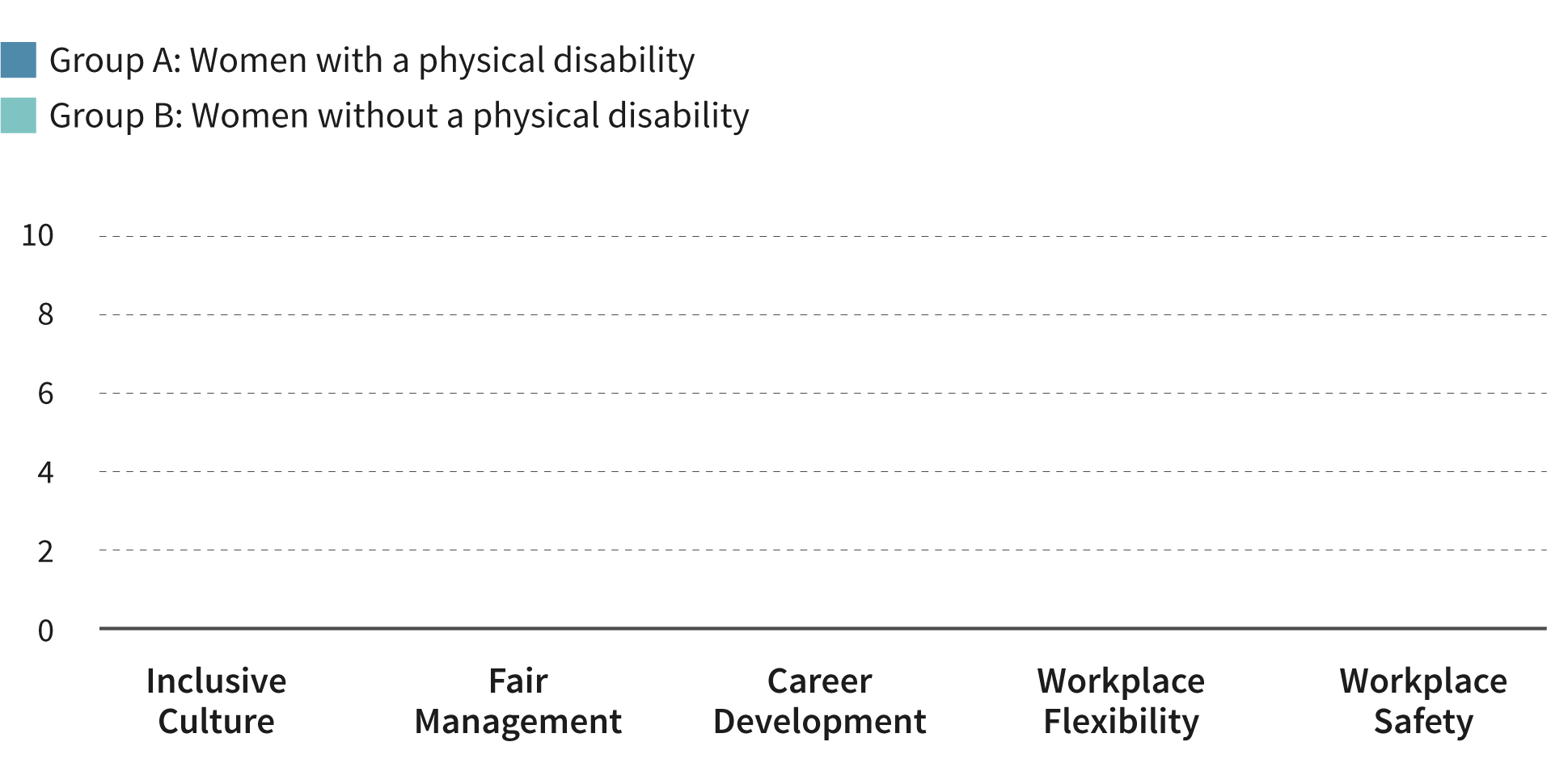
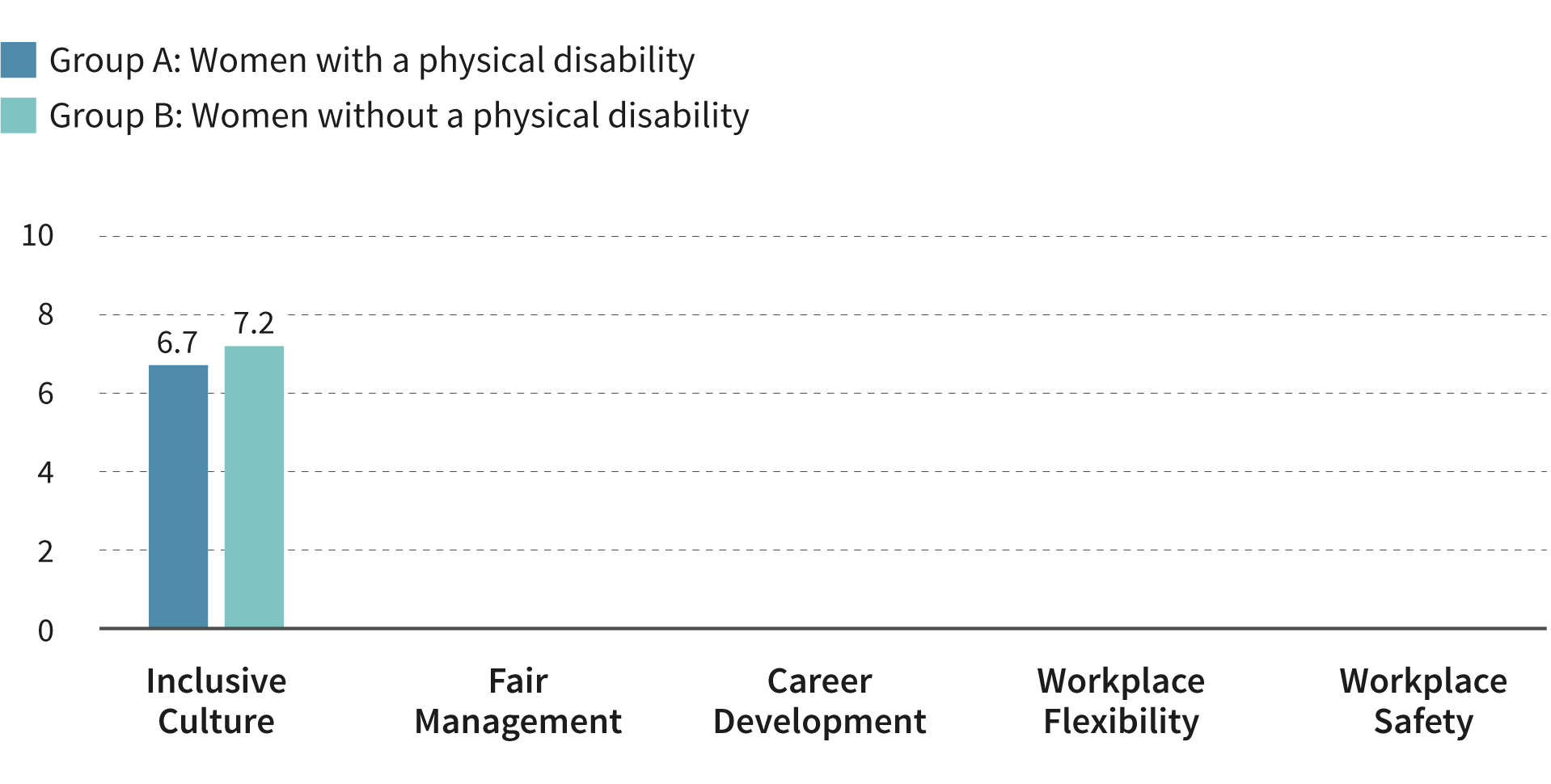
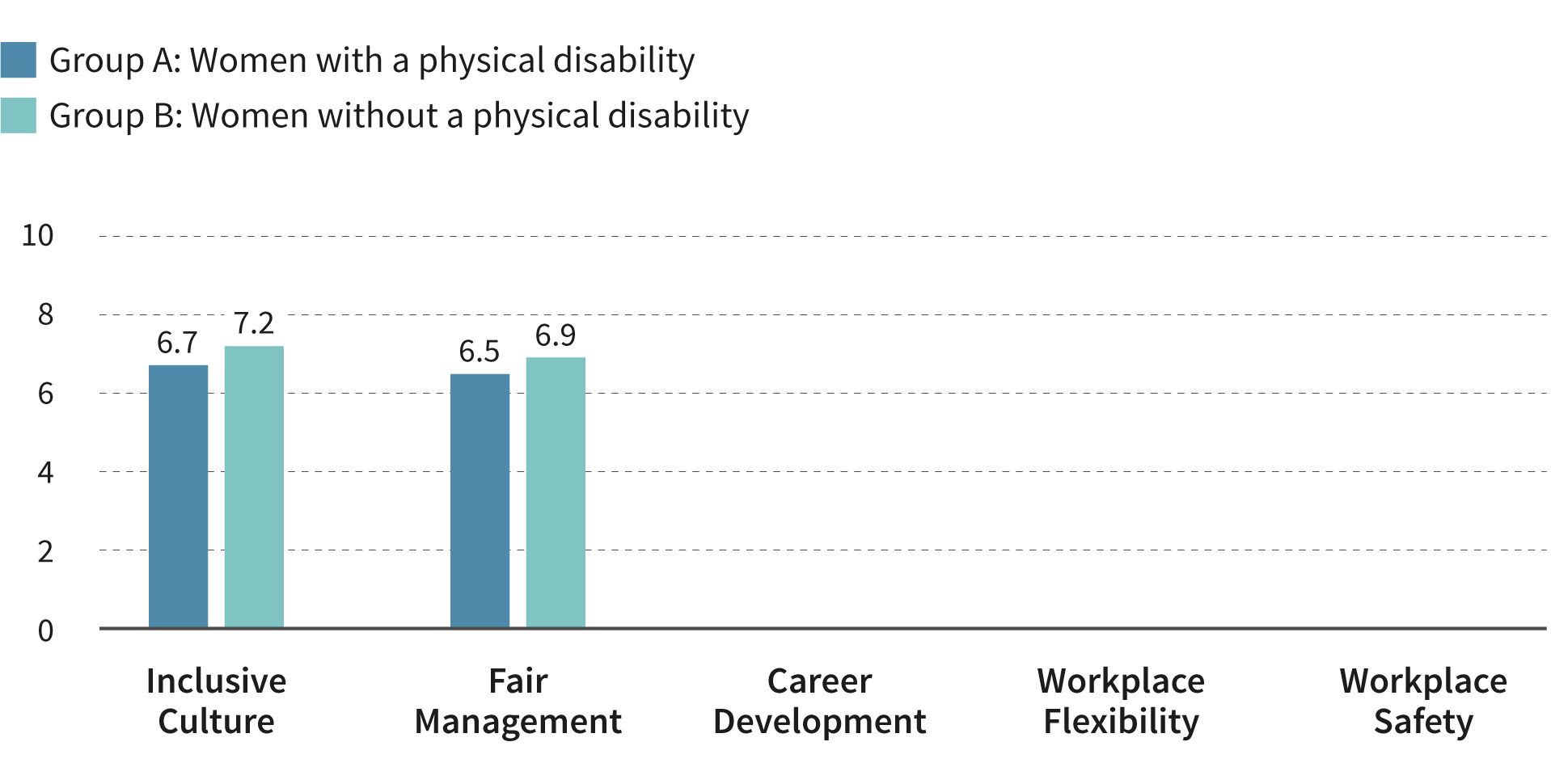
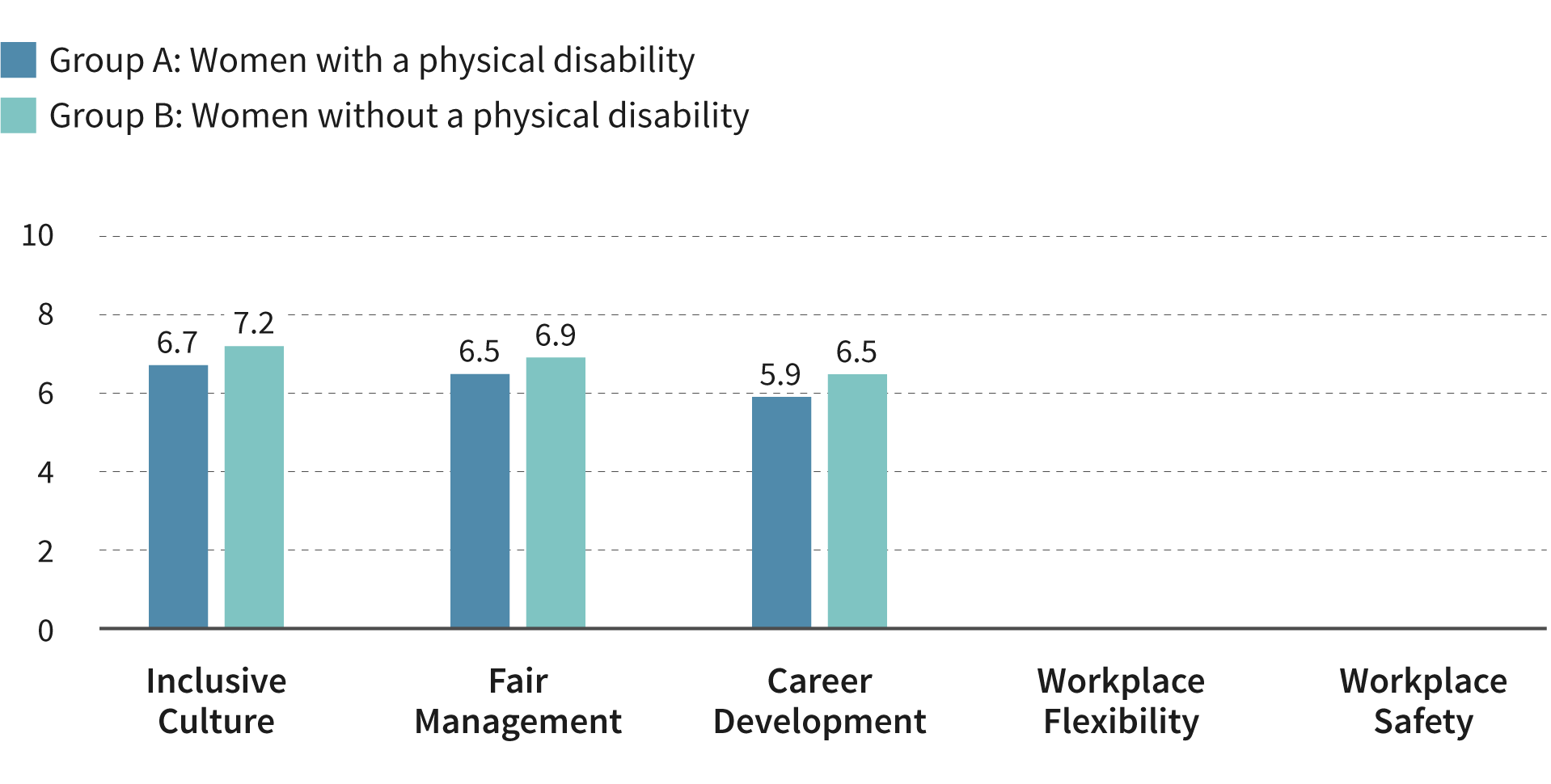

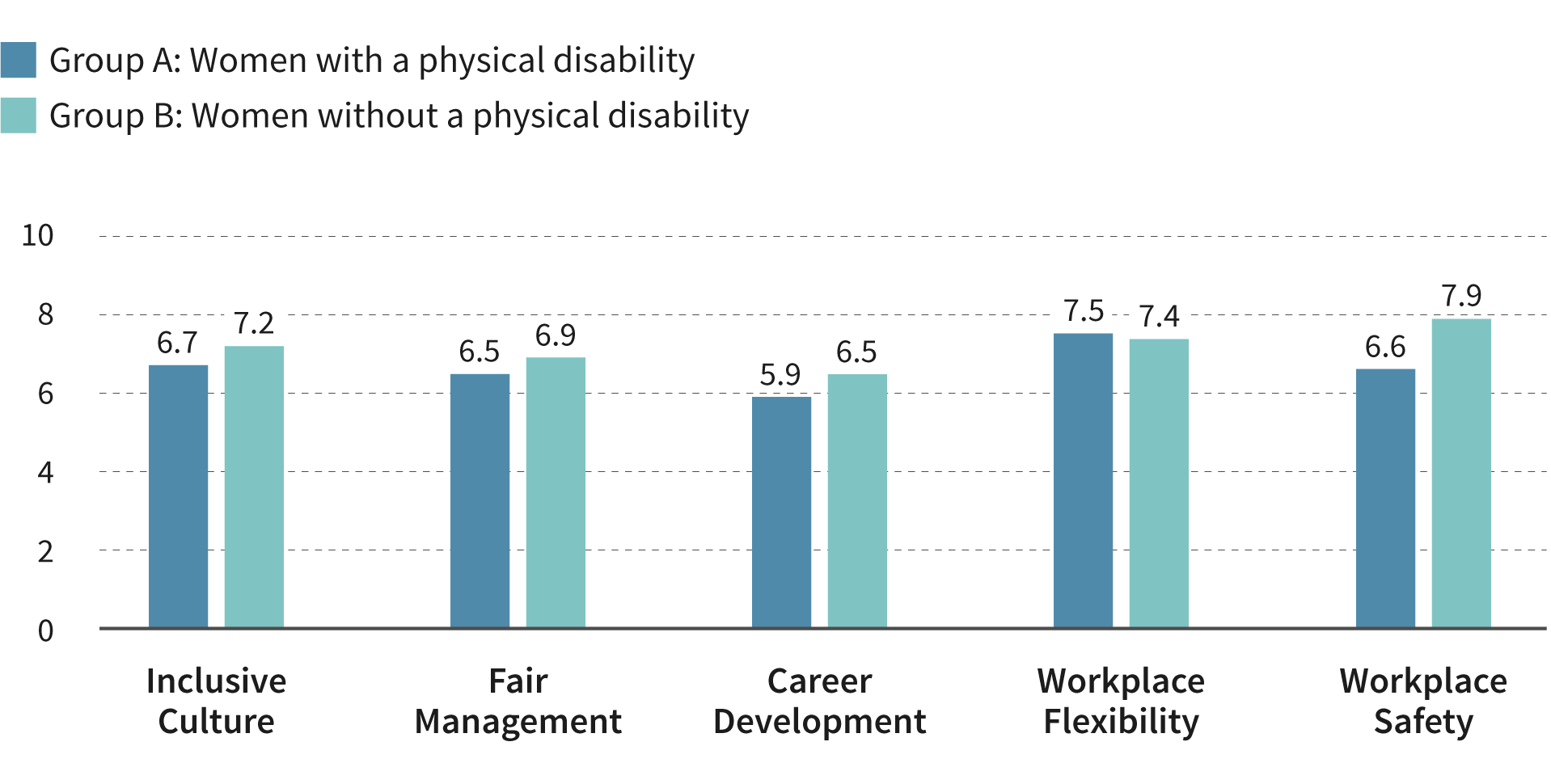
Analysis of the data for individuals reporting alternative cognitive or learning abilities, which include a range of conditions such as dyslexia, memory loss, ADHD and autism, show the highest level of self-reporting at C-suite level (13.7%) compared to managers (10.8%) and senior leaders (7.7%). The most significant differences when reviewing responses on inclusion were seen between men and women, with women having a far less inclusive experience than men across all inclusion metrics.
Intersectional data analysis: Inclusion scores across men and women with a cognitive learning condition
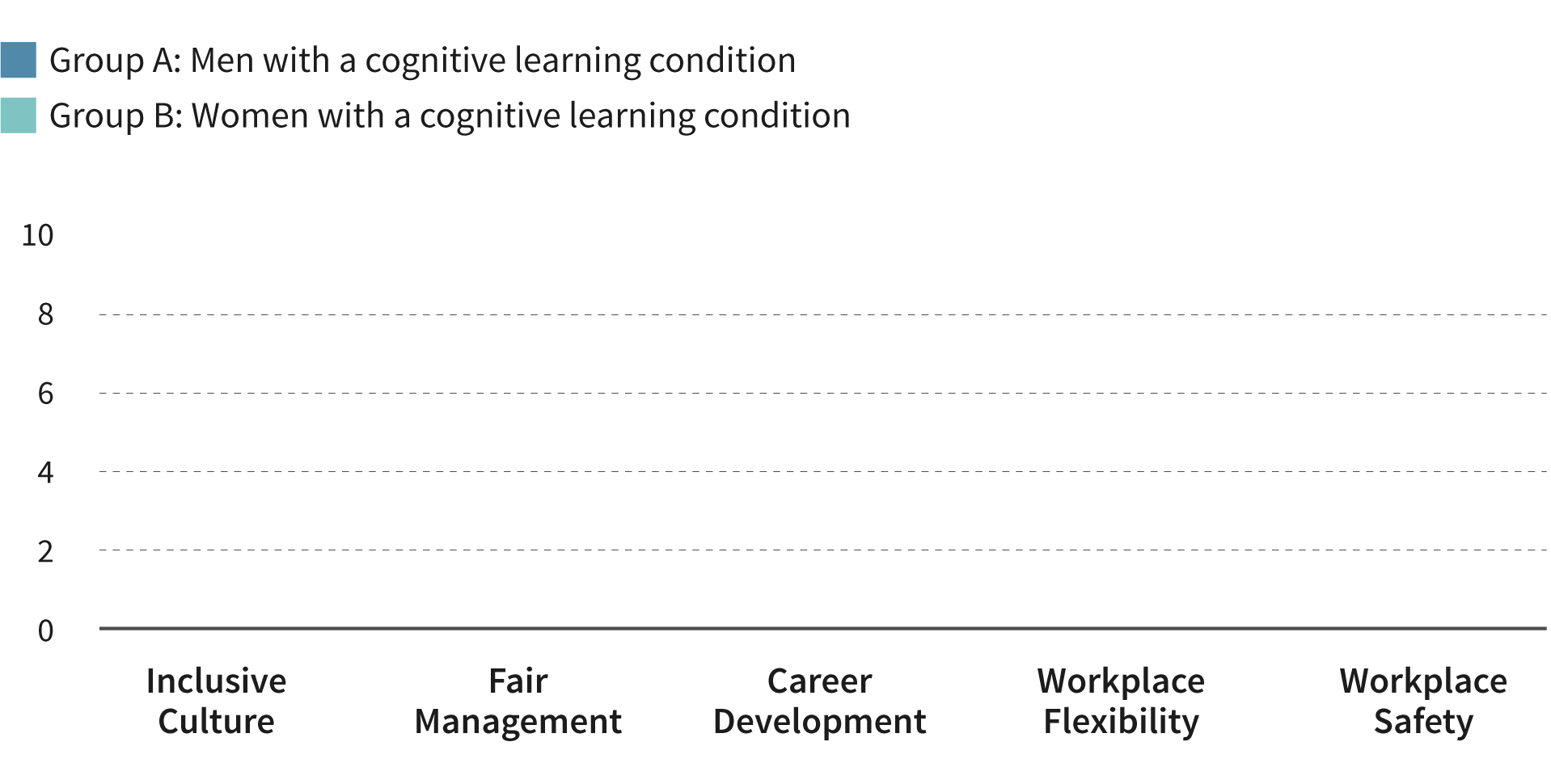
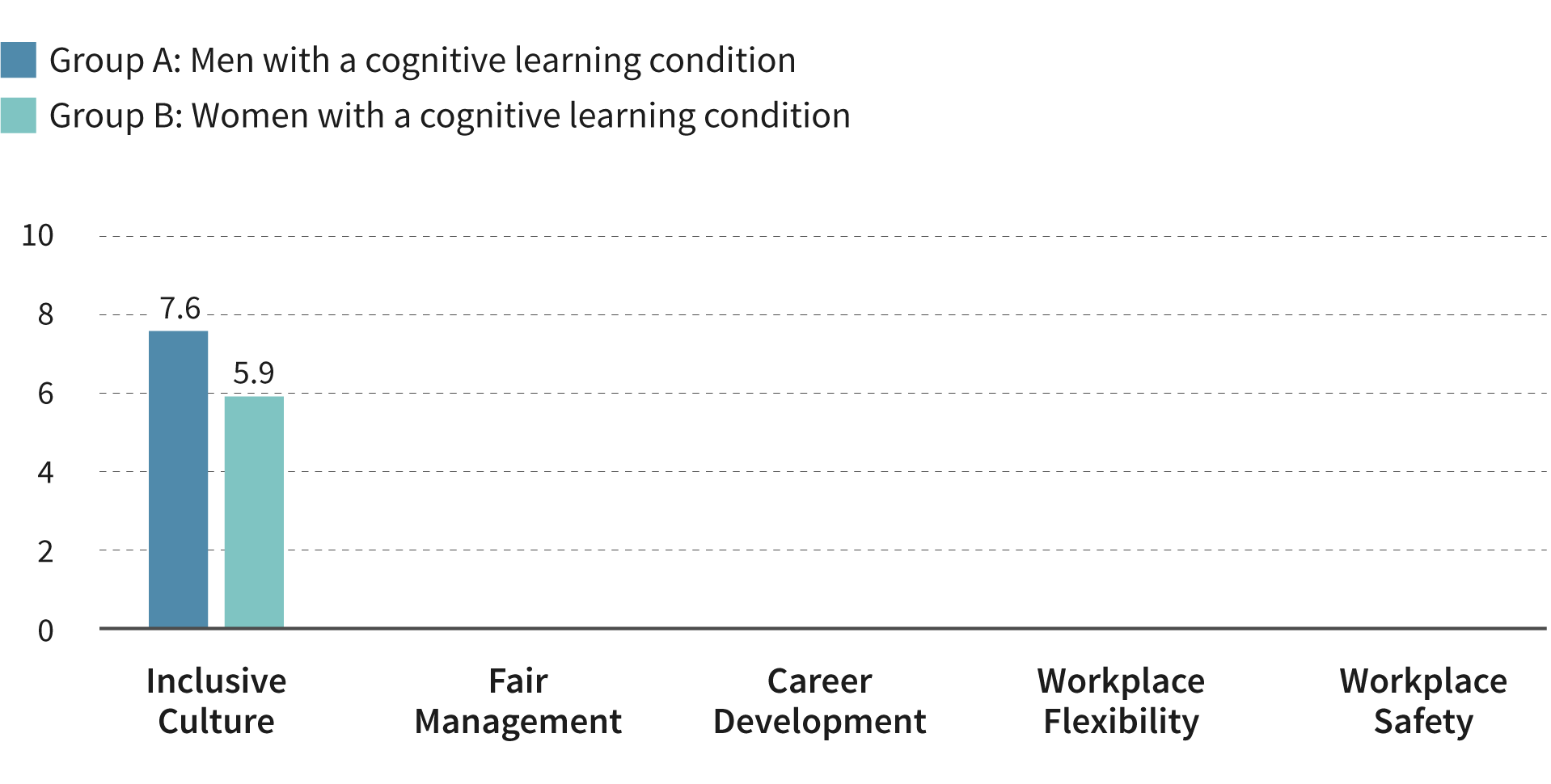

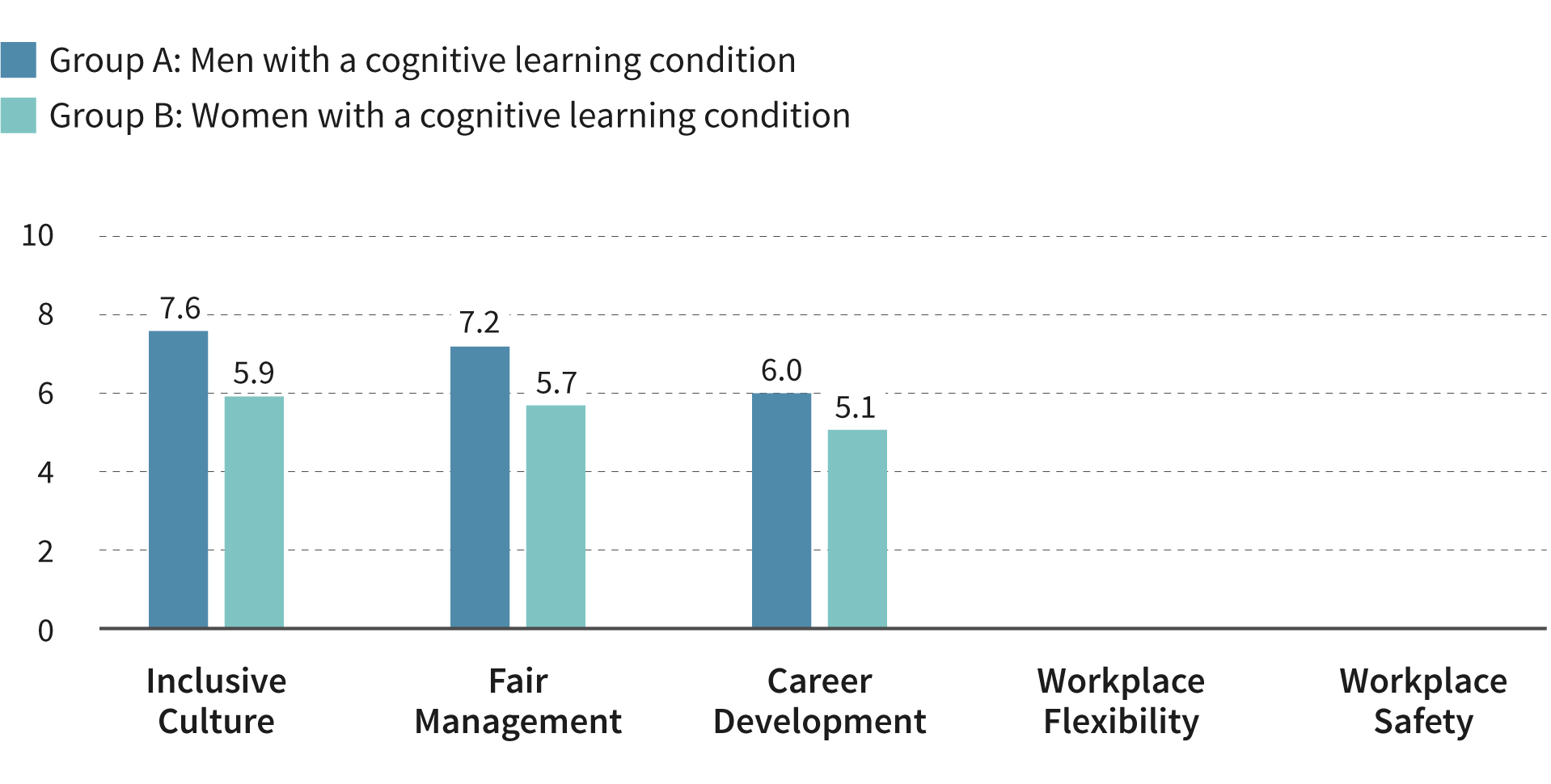
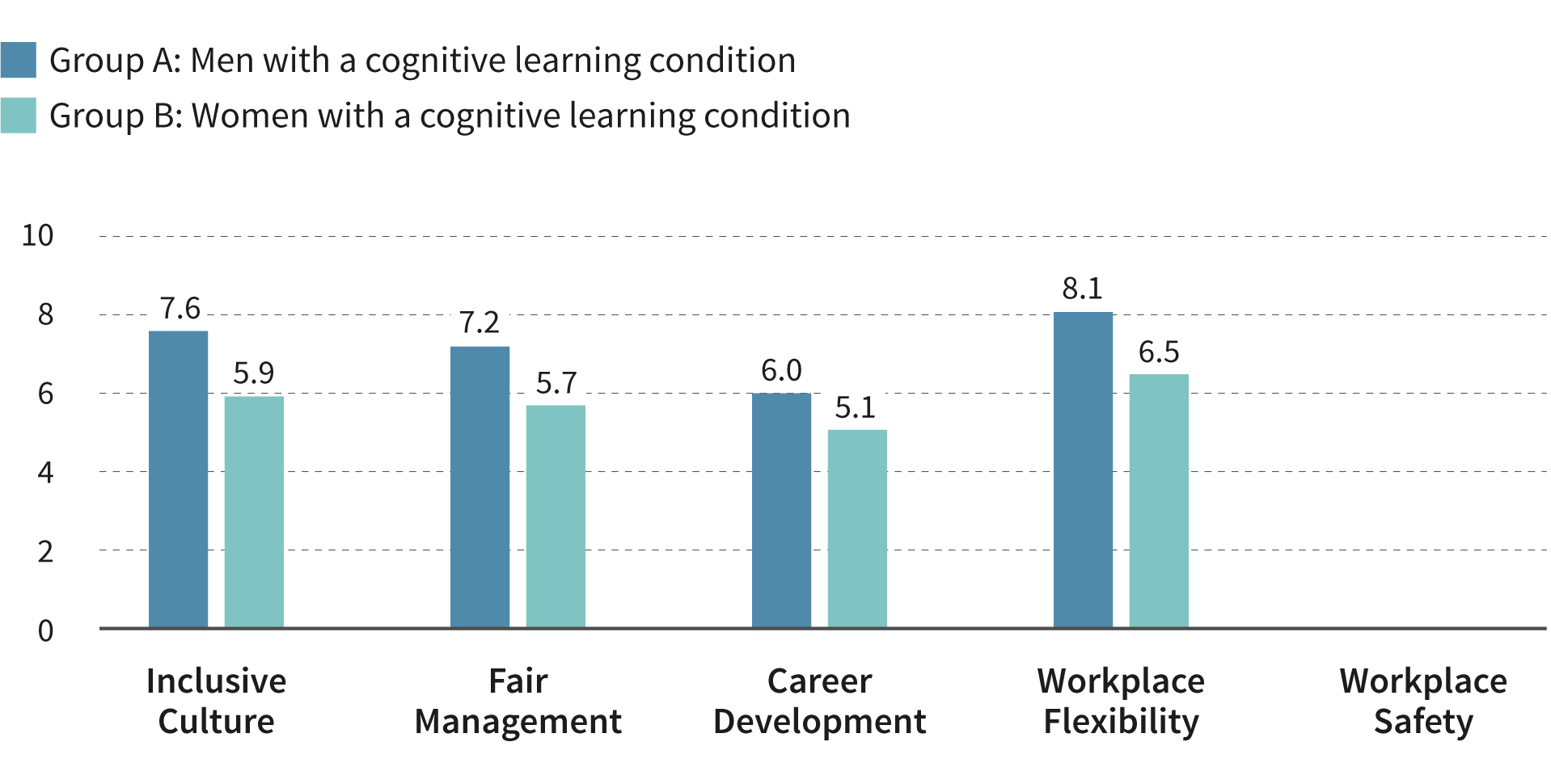
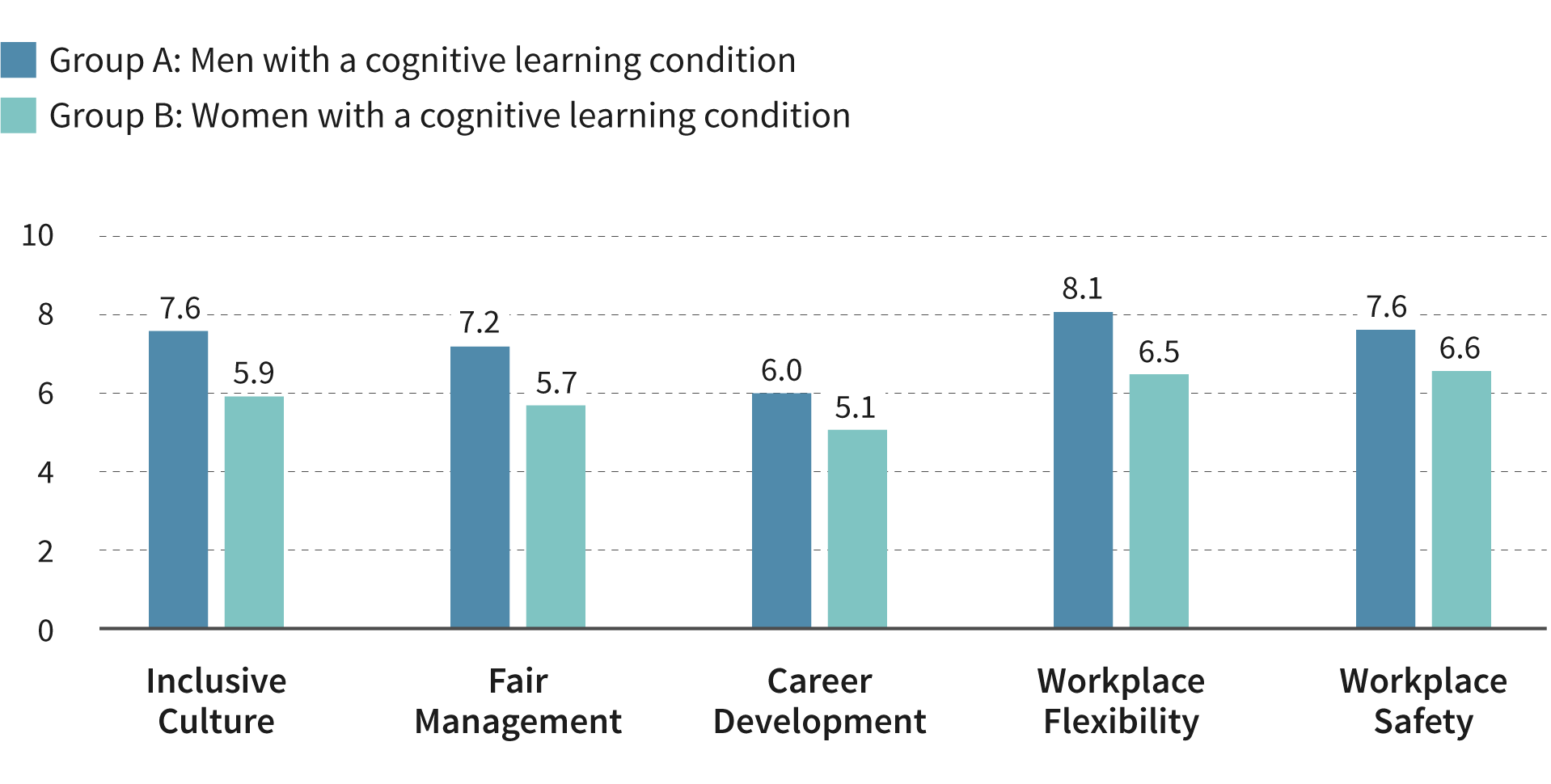

Fiona Irvine
Head of People and Culture, Sitryx
Sitryx are delighted to be involved in the BIA’s DEI work on behalf of our sector. This report gives us valuable insight as we develop our own DEI strategy, and helps us focus our resources on strategies that will foster an inclusive working environment for our employees to ultimately engage and retain our key talent and deliver quality, innovative science.

Sam Green
Office Manager, CytoSeek
We found the process leading up to the survey with BIA and Diversio very informative and engaging. We found the survey itself was short and easy to complete – both great elements for employee buy-in!
 UK Biotech Inclusion
UK Biotech Inclusion
6
Key
takeaway
The UK life sciences and biotech industry outperforms global biotech industry with meaningfully higher inclusion scores across all inclusion metrics used.
Whilst research has shown the impact diverse teams have on innovation and investment, companies should also pay attention to inclusion, even when they are relatively diverse. Inclusion is defined here as the sense of belonging, openness and trust within an organisation, it is a measure of how well the sector can retain the incredible talent it has worked so hard to attract.
When it comes to inclusion, the UK biotech industry outperforms the global industry with an inclusion score of 72.7% versus 62.2%, respectively. The largest distinction is that UK companies have been able to better cultivate psychologically and physically safe workplaces as well as offer a greater work-life balance to their employees, relative to their overseas peers. The area where companies could improve when it comes to inclusion, regardless of demographic traits and geographic location within the UK, is targeted career development – ensuring employees feel that someone senior within their organisation is able to create opportunities and is invested in their growth.

Charlotte Casebourne Stock
Co-Founder and CEO, Theolytics
Diversity and inclusion is a topic close to my heart, and this report represents a seminal piece of work for the UK biotech sector. It has been an honour to collaborate with the BIA team and membership as it has taken shape.
The data presented provides a benchmark against which we can calibrate our organisations, and set standards for excellence as diverse teams are a foundation for better decision making and accelerated innovation. It has provided us with insight into areas for improvement, and creates a framework informing where interventions can be most impactful.
Although we have succeeded in creating a more inclusive biotech sector in the UK than global benchmarks, there is still a lot of work to be done. There is work to be done to achieve gender parity at C-suite, and across essential skills; create a more racially and ethnically diverse sector; enable our LGBTQ2+ members to thrive; and better support socioeconomic mobility.
It is going to take a sustained effort as we work to build a more diverse and inclusive sector, and each of us has an important role to play. How will you bridge the gap? Share the word with #DiversityinBiotech.

Jacqueline Barry
Chief Clinical Officer, Cell and Gene Therapy Catapult
Innovation is at the heart of the Cell and Gene Therapy Catapult’s mission. We believe that a truly diverse workforce is needed to drive this innovation. This means we recognise the importance of supporting the uniqueness of each of our employees and we strive to provide a supportive environment for everyone.
We are delighted to be part of this work led by BIA which aims to drive greater diversity and inclusion in the UK biotech field.
 Role of Advocates
Role of Advocates
7
Key
takeaway
A meaningful difference exists on inclusion scores between different demographic traits across the UK life sciences and biotech sector.
Within this survey the demographic traits associated with the majority of leaders and those within positions of authority within the sector are combined with inclusion scores from all individuals with those traits to form a ‘dominant group’. The dominant group for the purposes of this survey are white, heterosexual males without a disability. A meaningful difference exists between how the dominant group experiences the workplace and the non-dominant groups. In fact, the experiences of women, people of colour, LGBTQ2+ individuals and those with physical/cognitive/mental health conditions are lower on every inclusion metric except career development – where all employees have low scores regardless of identity. Overall, non-dominant groups have the largest inclusion gaps when it comes to being able to maintain a work-life balance, feeling valued by peers, and feeling psychologically and physically safe in the workplace.
With respect to this report, the dominant group is significant as the profile most often seen at the leadership level and typically influencing company culture by up to 30%.
Overview of inclusion scores across UK Biotech
| Inclusive Culture | Fair Management | Career Development | Workplace Flexibility | Workplace Safety | |
|---|---|---|---|---|---|
| Industry Score | 6.9 | 5.9 | 5.7 | 7.1 | 5.5 |
| Your KPI Score | 7.3 | 7.0 | 6.3 | 7.8 | 8.0 |
| Dominant Group | 8.0 | 7.3 | 6.5 | 8.5 | 8.8 |
| Women and Non-Binary | 7.1 | 6.9 | 6.4 | 7.4 | 7.7 |
| Racial and Ethnic Minorities | 7.00 | 7.1 | 6.2 | 7.3 | 7.8 |
| LGBTQ2+ | 6.9 | 6.8 | 6.7 | 7.6 | 7.6 |
| Physical/ Cognative / Mental Conditions | 6.7 | 6.7 | 5.9 | 7.4 | 7.2 |

Claire Thompson
CEO, Agility
Gathering baseline data is so important in understanding the status of our sector. Diversity doesn’t just happen on its own, we need to build diversity by design. The role of madvoates (male advocates) is critical to enabling women, teams and companies to be the best they can be – we shouldn’t be pushing for equity on our own.
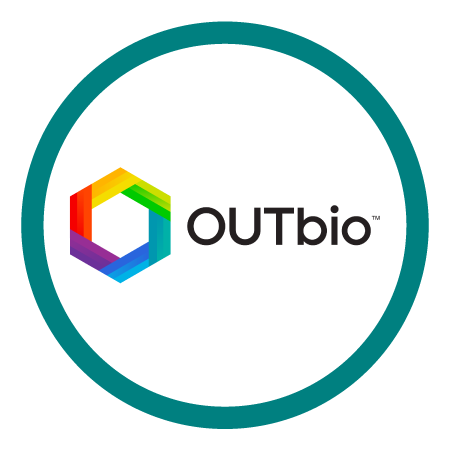
Tom Donovan
Director, OUTbio
OUTbio UK is providing the growing and diverse UK biotech workforce with a dedicated community and resource for networking, knowledge sharing and support.
OUTbio UK is an independent network and forum run specifically for the LGBTQ+ community and its allies within the biotech community in the UK. Our mission is to connect LGBTQ+ professionals within the biotech community, provide mutual support and mentorship, share ideas about how to implement best practices within our companies and develop our own networks and friendships. OUTbio UK is one of several OUTbio organisations serving the biotech industry in different countries. For companies and organisations wishing to partner with OUTbio UK, please contact info@outbio.uk.

Jane Wall
Director of Business Development and Membership Services, BIA
For start-ups and SMEs in particular, it can be challenging to find outlets through which people can broaden and develop their knowledge of the sector, and connect with peers and potential mentors.
BIA provides semi-structured programmes and networking that can help the Women in Biotech Mentoring programme, BIA Manufacturing Advisory Committee Leadership Programme (MAC LeaP) for rising stars in bioprocessing and PULSE (Programme for Up-and-coming Life Science Entrepreneurs) all provide career support, sector understanding and personal inspiration.
BIA membership groups also provide a fantastic ready-made network with a specific technical or topic focus and our networking events all provide great opportunities to build career-enhancing links whilst benefitting from sector-leading thought-leadership.
 Role of Leaders
Role of Leaders
8
Key
takeaway
A meaningful difference exist on inclusion scores between levels of leadership throughout an organisation across the UK life sciences and biotech sector.
What leaders across our sector say and do makes up to a 70% difference as to whether an individual reports feeling included20. This really matters because the more people feel included, the more they speak up, go the extra mile, and collaborate — all of which lifts organisational performance. Data from this survey shows that C-suite executives responded more positively to inclusion metrics across their workplace than those working at other levels in their organisations. The further into the organisation the lower the inclusion scores. There is a role for senior leaders setting the strategy and organisational culture to pay attention to inclusion across the entire organisation.
Overview of inclusion scores across UK Biotech
| Inclusive Culture | Fair Management | Career Development | Workplace/ Flexibility | Workplace Safety | |
|---|---|---|---|---|---|
| Individual Contributor | 7.0 | 7.0 | 6.1 | 7.7 | 8.0 |
| Management (Supervisor, Assistant Manager, Manager, Team Leader, Etc) | 7.3 | 6.7 | 6.3 | 7.5 | 7.8 |
| Senior Leadership (Director, Senior Director, Etc) | 7.8 | 6.9 | 6.5 | 7.7 | 8.2 |
| C-suite (Vice President, Executive, Etc) | 9.2 | 7.9 | 7.7 | 9.1 | 8.6 |

Hsin Loke
SVP, Finance and Operations, OMass Therapeutics
At OMass, we are proud to have a female founder, Professor Dame Carol Robinson, and strong female leadership, in our CEO Ros Deegan and more than 50% female Board membership. We also have a gender balanced (50% female) and culturally diverse team, with more than 20 countries of origin represented across our team of 55 people.
We believe diversity and inclusion is foundational to achieving OMass’ ambition to discover new medicines – we want people to thrive at work and be innovative. To date, we have taken intentional actions, e.g. embedding inclusion within our Values expectations and running DEI learning sessions. However as a small company, we see huge value in having benchmarking data and taking positive actions as part of the BIA community. We are using this survey data to continue conversations on how to improve inclusion at OMass. We are keen to learn what others are doing across the community and looking forward to championing DEI actions as part of the BIA group.

Carolyn Porter
CEO, CytoSeek
Being or striving to be visibly diverse is not enough; to be successful you need to translate the benefits of diversity into inclusivity in your day to day operations, how you innovate and how you value people. We welcome the Diversio initiative from the BIA to help us benchmark our DEI initiatives, develop industry leading practices and continue to put DEI at the forefront of how we run our company.
 Recommendations
Recommendations
Based on findings from this survey, BIA and Diversio offer recommendation that UK life sciences and biotech companies may want to consider to improve diversity and inclusion in their organisations. BIA also has some guidance on how to support the sector in achieving their diversity and inclusion objectives.

Collect and benchmark data
Collect & benchmark data – Organisations are encouraged to collect, analyse, report and track diversity and inclusion data within their own workplaces. Every company should start by assessing their current state, creating a baseline relative to peers (using the work carried out in this report) and setting concrete goals for improvement on priority metrics.
BIA has provided benchmarking within this report and will continue to provide requests to access this data.

Leaders champion action
Company leaders are encouraged to champion action by embracing allyship, developing themselves into truly inclusive leaders and coaching their teams to lead with inclusive mindset, behaviours and actions.
BIA will signpost organisations and partnerships with which companies can work to address specific actions within their own diversity and inclusion gaps.

Inclusive recruiting and hiring practices
Companies are encouraged to continue to pursue inclusive recruiting and hiring practices, with a specific focus on hiring Black employees overall as well as women and people of colour into senior leadership. The goal is for UK life sciences and biotech talent pipeline to be representative of the overall UK population.
BIA will provide a forum to share best practices and policies for member organisations across the sector.

Career mentoring and sponsorship
Companies are encouraged to roll out programs and policies that address the industry-wide inclusion pain points that have been identified in this report, such as career development. Specific attention should be given to under-represented groups who face the greatest barriers and challenges with regards to these metrics.
BIA will continue to provide mentoring, network and sponsorship opportunities for membership organisations across the sector.
 Industry Spotlights
Industry Spotlights
DEI is integrated into our business strategy as we strive to be more diverse and inclusive as a business. We believe recruiting a more diverse workforce makes a positive impact on innovation, while inclusion improves employee attraction and retention.
As a DEI thought leader, we look forward to leveraging the Diversio platform by feeding the results into our DEI strategy and influencing the biotech industry in general which we hope will provide more career opportunities.

Helen Goodwin
Head of Human Resources, Astex Pharmaceuticals

Sonia Luczynska
Group Operations Manager, PrecisionLife
Our vision is to ensure that all our colleagues have the best environment to reach maximum of their potential and to attract new talent. We’re committed to equal opportunities and nurturing a supportive, fair and fulfilling environment in which to work, create and grow – ensuring that all our employees receive the same treatment and opportunities.
We are building a workplace that is known for its welcoming and inclusive approach. In return we will be able to support our partners and collaborators in generating better and more personalised medicine solutions, creating the medicines of the future. This benchmark presented a great opportunity to evaluate our Diversity and Inclusion project we have established internally, and to cooperate with different organisations in the same industry facing similar challenges. We can learn a lot from each other and develop our best practice.
How is DEI integrated into your business strategy?
We hope that learning from the findings of the survey is only the first step, and that we will integrate DEI further into our ESG reporting and establish champions throughout the company to promote the related mini-projects.
How do you plan to leverage the Diversio platform in your business?
We will consider building it into the Diversity and Inclusion Plan if there is an opportunity to introduce it to all our employees across all office locations. This way we will have more inclusive view on the team structure.
What goals are you looking to establish based on the Diversio insights, what difference do you think these will make to your business and the biotech industry in general?
Thanks to the findings of the survey, we can see that the path we have taken so far is leading us in the right direction. It shows us as well what are the more general challenges that other organisations, some of them are on the next growth level, are facing and allow us to learn from their experience and global findings of the survey.
What role can you now take as a DEI thought leader in the UK BioTech sector?
The understanding of the importance of comprehensive and and a company-specific designed Diversity and Inclusion Plan is already present among DEI leaders. The next step is to understand the specific needs of the organisation and our teams to ensure that the plan crafted is appropriate, manageable, and well monitored to follow the response. This requires involvement from all staff, setting examples and championing the project across the organisation.
We took part in the BIA’s Diversity report to support this important sector-first initiative and provide a solid baseline as we look to more actively consider Redx’s ESG agenda.
At present, DEI is not integrated into our strategy, but we recognise the importance of recruiting and retaining talented individuals and the positive cultural benefits of a diverse and inclusive workforce.
The insights received from the Diversio platform help inform our decisions and steps we can take as an employer to address areas where we have gaps when compared to the sector in a positive way that is valued by our employees.
We are excited to see how the BIA’s DEI report helps us to understand how the UK biotech sector is performing with respect to DEI matters and where Redx is well-positioned to help advance this important agenda.

James Mead
Chief Operating Officer, Redx Pharma

Reeta Daswani
Research and Development Scientist, Sixfold
We participated in the BIA Diversity and Inclusion in UK Biotech report because we felt the output would allow us to make data-driven decisions based on industry benchmarks and, importantly, we could contribute to wider industry analysis on where the wider biotech sector needs to prioritize.
It also provides transparency for the Sixfold team on where we sit and helps us learn from other companies to create a more inclusive workplace.
How is DEI integrated into your business strategy?
Fundamentally, we want to build and be part, of a company that makes fair and equitable decisions. There are a couple of actions Sixfold has taken on this front, including:
1) merit-based promotions based on a clear skills-based career framework to clearly describe what each level looks like
2) transparent pay bands so groups that are statistically more likely to negotiate lower salaries are paid fairly
3) women in leadership positions (including a majority female board)
4) social mobility programs for underrepresented groups
5) mental health responders
6) a welcoming and inclusive recruitment process
Where do you see it making a difference in innovation, returns, employee attraction and retention?
A common response to “Why Sixfold” during the recruitment process is that people want to work for an inclusive workplace and that they can see this at Sixfold. This means we can attract the very best researchers from all walks of life. Retention is focused on creating a merit-based environment, where people feel valued and, importantly, want to put their all into solving challenging scientific questions.
How do you plan to leverage the Diversio platform in your business?
Diversio has helped us connect with other businesses in the sector looking at ways to push DEI forward. We want to use this network to show what works with us and implement great ideas from other companies to improve further.
What goals are you looking to establish based on the Diversio insights, what difference do you think these will make to your business and the biotech industry in general?
One of the realizations from Diversio was that the amazing DEI policies and actions we have in place at Sixfold are not common practice in the biotech sector. On average we scored 20 points higher than those that took part in the survey and are typically more diverse, including gender and disabilities. The report has highlighted that we are on the right track, although there are always areas to get better! Insights showing us where we need to strengthen and what else we could think about have been particularly useful.
What role can you now take as a DEI thought leader in the UK biotech sector?
An effective DEI strategy is not just about creating a more equitable workplace, but something that leads to improved performance and employee retention. Each company will have their own unique culture and way of operating, so hearing strategies from multiple perspectives will be useful for implementing an effective DEI framework across the industry. Hopefully, as a group, we can start to facilitate industry-wide tools to ensure people promote and understand diversity in the widest possible sense – age, abilities, socio-economic background, race, gender, and sexual orientation – to help remove barriers for all groups.




4
Key
takeaway
37% of C-suite respondents come from a family background where a PhD was the highest level of academic qualification compared to 21% of managers.
Social mobility in STEM is a challenge. According to the Social Mobility Commission16, just 9% of life sciences professionals, 15% of scientists, 6% of doctors, 19% of tech workers and 21% of engineers come from a working class background. Those from a family with a professional background are two and a half times more likely to end up in a professional role than someone from a lower socio-economic background. The survey data reports that 35% of those in senior leadership roles and 37% of C-suite positions come from a background where a PhD was the highest household qualification compared to 21% of managers and individual contributors. According to Inclusive Boards, roughly a third of Board members and senior executives from tech businesses attended private school, 7% of the UK and 35% of Board members and 26% of senior executive attended Oxbridge17, compared to less than 1% of the population.
Improving social mobility could have far-reaching consequences for the sector. There is a significant – and growing – supply-demand imbalance in the STEM sector and a shortage of skills across UK biotech research, development and manufacturing positions. Improving social mobility also benefits society and research shows us that organisations that are diverse perform better and think faster18. Cognitive disparity helps businesses to see challenges and opportunities in new ways, resulting in a competitive edge that companies with heterogenous thinking miss. Differences in socio-economic backgrounds are just one example of how diversity can be improved in the sector.
Social mobility indicators across leadership roles
Luke McKelvey
Development Manager, In2scienceUK
In2scienceUK gives young people from low-income backgrounds the opportunity to gain essential insights into STEM research and careers. Since 2011, In2scienceUK has provided young people with the experience, skills and confidence they need to reach their potential in STEM.
In2scienceUK developed the In2research Programme to support people from under-represented backgrounds progress to post graduate research. The Programme provides young people with eight weeks of relevant research experience led by dedicated PhD researchers. Each young person receives a bursary to remove any financial barrier to participation. The In2reseach Programme aims to address the imbalance of opportunity for postgraduate access.
In2scienceUK was awarded The Queens Award for promoting opportunity through Social Mobility in 2021 and aims to continue to ensure more young people reach their potential and support diversity and inclusion within the STEM sector.
References
16 The_class_pay_gap_and_intergenerational_worklessness.pdf (publishing.service.gov.uk)
17 Challenging Perspectives: Socioeconomic Background in the UK Tech Sector – Inclusive Boards
18 How diversity, equity, and inclusion (DE&I) matter | McKinsey